#basically just his overarching narrative throughout the series
Explore tagged Tumblr posts
Text
made a little analysis thread on twitter and thought I’d share it here too if that’s chill ^_^
anyways traffic!impulse using self destruction and the destruction of others as a way to cope with his own frustration and resentment throughout the life series: a messy ramble-y post because I’m crazy.
most of this behavior really only starts after third life. his destructive behavior before then is usually outward and not with malicious intent. instead, he hurt others in third life because he was asked to. it was a part of a greater plan he was undoubtably loyal to and that would later get him killed and tarnish his reputation for seasons to come.
that’s why in last life, he’s much more open to antagonistic behavior (which he barely partook in before and only would if asked of). this mostly includes all the stealing he did that season, the numerous break ins, and of course, spawning the wither. this could also include his personal insistence on becoming the boogeyman and even planning it out in advance (which would later get him killed, his own hubris). he was itching for it to be his turn.
it’s such a huge shift from how he acted in third life, and why? personally, I think it’s because of all the strain and pressure put on him by others and their disdain towards him. specifically the rumors spread about him and the reluctance of others to believe and trust him after what he’d done the season prior. which for some people is justified, like ren and etho, but for others, like bdubs, is not. and this was shown to upset impulse a lot, given how it resulted in him being thrown under the bus, even by his own teammates.
but he’s supposed to be nice and considerate and smart to make up for all he’s done, right? that’s why he sticks with his alliance the whole time and makes a point to be loyal to them and them only. but that doesn’t stop the resentment and anger boiling, and he can only take so much before he has to let off some steam, and destructive behavior seems to be a means to do so.
it turns from him doing bad things because he’s asked to to him doing it because he wants to, to cope. which is why when all else fails and the southlands fall apart, despite him taking the measures to prevent it earlier on, he helps grian spawn the wither, even with the risks and deaths. and he insists on doing it at best’s base, because they ruined him. it gets him killed. he should’ve been smarter.
it gets worse in double life, specifically when homewrecking is proposed. while he’s not the one to bring it up or start the rumors, he soon grows comfortable enough to start talking smack himself. him and bdubs deliberately try to ruin the relationships of others, and they tell themselves it’s to steal away half of each pair for their own benefit, but maybe there’s more to it. maybe they ARE projecting, just like joel had said.
it doesn’t help that impulse is having his soulbound questioned and bdubs “needs” a clock and the horns won’t shut up. when they’re exposed, he takes his destruction to the deep dark. he throws snowballs, he spooks unsuspecting people, he yells into the dark when he finds out his voice can trigger the sensors. throughout the season, he makes multiple efforts to cause distress in the deep dark, malicious intent or not. and maybe it’s to cope with the fact that bdubs keeps sending him down there or etho won’t stop yapping about how bdubs doesn’t want him or how bdubs put a major target on their backs.
and this is when self destructive behavior really starts, too. impulse gives away valuable resources when he realistically could’ve not, he takes risks he absolutely doesn’t have to take (despite how much he values his and, by extension, bdubs’s life), when he’s linked to the fishing rod sequence of death, all he says to bdubs is that it was fun while it lasted. and then he loses their first life trying to get a music disc.
whether he means to or not, he’s slowly killing himself and his soulmate, too. and eventually, by the time he’s red, he just gives in. he starts blowing horn (surely there’s some symbolism there), he terrorizes those better off than him, he wants to cause problems. yet there’s always still some humanity in him that shines through, regardless of his destructive ways of coping.
but this isn’t about that. before the final fight, he even grabs the golden apple him and bdubs had been stashing away, saying if they can’t win, no one can. he would’ve ate it. he should’ve ate it. yet he didn’t, and he died by bdubs’s hand again. more resentment grows.
by limited life, it’s obvious he’s open to dabbling into more chaotic pastimes. bdubs’s ignorance and unwillingness to see his flaws and apologize only fuels the fire. when he’s chosen as the boogeyman, he has a time with it. but he still has the mind to know not to hurt his team, even refusing to use skizz’s accidental death to cleanse himself. but he bombs bread bridge freely, somehow even getting tango and skizz to help him. it’s almost concerning how much fun he has with it.
then of course there’s the complete destruction of bread bridge, which he happily takes part in. and tango’s boogey kill on bdubs, in which he lures bdubs to his demise (something he had been itching to do for seasons). he amasses a huge kill count over the season, his first time murdering anyone since third life.
most of his behavior this season turns more outward, and he grows more keen on sustaining himself the more faith his team puts in him. he is also shown to hold other alliances much less dear than ties, even if they benefit him. this results in the betrayal of many, most notably mean gills in the finale. he fights like hell, he gets his final revenge on bdubs and ends his season, and yet it still isn’t enough.
he begs martyn to kill him, because he’s alone, and he’s scared, and he did all he was asked to do. but they keep him around, despite his pleas. he’s given the illusion of free will, a chance to win, to be given a fair fight. martyn slaughters him in cold blood. a cruel betrayal.
secret life feels like a reset, and most scores are settled, and secret tasks heavily dictate how the sessions go. he isn’t given the chance to cause mass destruction like he could the season prior. he’s not sure if he wants to. most of his mistakes are honest, no self destructive or malicious intent, same with his tasks.
he’s with a team he can trust and confide in. they help him. they care about him. his first two deaths are consensual and willing, something’s he’s never known. the season is rough, but he’s happy. he tries to use his trap as he’s being chased, risky as it was, a final act of stubbornness.
he dies, alone and scared, hearts quivering. nothing’s new. he’ll just have to be ready to cope again tomorrow. get some blood of his hands, whether it’s his enemies or his own.
#mxmarsblurbs#this is just my interpretation btw#impulsesv#traffic!impulse#this is strictly about his character#just some analysis#because why not#he does dumb stuff sometimes and I just wanted to give a method to his madness#3rd life#3rd life smp#last life#last life smp#double life#double life smp#limited life#limited life smp#secret life#secret life smp#the life series#life series smp#trafficblr#idk how to tag this#basically just his overarching narrative throughout the series#clock duo#their relationship is mentioned pretty frequently#I wont tag anybody else though#for everyone’s sake#mars insanity#as usual#trying out fun tags
57 notes
·
View notes
Text
Quite honestly I have to say that I actually really like Aang. Him being a happy-go-lucky, sweet kid is extremely important to the story, as bringing back a sense of fun to the people who have been experiencing war for so long is basically his narrative purpose. There's a purpose behind his personality, just as there should be in any narrative. However, I think anyone who engages critically with media has to aknowledge that he makes some bad decisions, especially when it comes to his treatment of Katara at the end of season three. Although I would personally argue that this is sexist writing and not congruent with the Aang we have seen for the entirety of the show leading up to DoBS (although people are also right when they point out the amount of emotional labor his position as the grand hero of the story and as a rather immature kiddo put on Katara), these are still mistakes that the character canonically makes. His treatment of Katara in previous seasons is still toxic behavior that I would argue is actually congruent with his character. The mistakes he makes throughout the series in other areas, such as hiding their father's location from Sokka and Katara, are canon decisions the character makes that are also definitely congruent with his character. But for whatever reason, a lot of the fandom refuses to recognize this. Most Aang/ Kat@ang stans put Aang on a pedestal and argue that nothing he's done throughout the series is exactly wrong. Nothing was wrong in his treatment of Katara, and if it is, he's naturally extremely sorry about it and should be forgiven despite the fact that we see no expression of guilt or remorse from him for, what I believe is the most glaring example, the EIP noncon kiss. So again, to restate, I don't hate Aang. I've never hated Aang. I like Aang. But unfortunately, because of the fandom representation of him, I have no interest in engaging in fan content about him. I have no interest in talking about the good things he does or the great decisions he makes outside of his decision not to kill Ozai, which, although greatly contested in the fandom, I completely agree with because of the narrative significance of Aang choosing to stick to his beliefs and the overarching theme of mercy, which we also see built up in many previous episodes such as TSR. Aang is the character that I would argue has been corrupted the most by the fandom. He's either viciously hated or hoisted into a position of perfection and frankly, I can deal with neither. Aang is a good character, but we should be able to have conversations critical of his actions. Aang is an extremely flawed and relatively underdeveloped character, but he is by no means evil incarnate, and I just wish that more people could recognize that both of those statements should and do coexist.
#atla#aang#aang critical#anti kataang#technically#anti bryke#fandom salt#anti aang stans#anti kataang stans
93 notes
·
View notes
Note
i'm currently rereading thtf rn, and in one of the author's notes at the end of the chapter you said that you think voldemort wasn't a good villain. i agree with you on that 100%, and i'd really like to hear all your thoughts on why you think that way.
fun question!!! i am happy 2 discuss w the caveat of course that this is all my subjective opinion etc etc
i feel like the reasons i don't think voldemort is a "good" villain (in terms of storytelling) can sort of be broken into 2 main things
1: voldemort as a character
so by this i mean, without looking at the broader story or wizarding society + how voldemort's character functions like...narratively within the story, just looking at the character itself. characterwise i think voldemort is just....pretty flat.
like, from the way dumbledore describes voldemort as a child, we're basically supposed to view him as a character who has always been fundamentally evil, like he was "born bad." sure, there's some gesturing towards society with the tragic backstory w his parents, growing up in an orphanage, hating his dad, etc. but none of that is fully fleshed out in a way that indicates voldemort might have been good if his circumstances had been different; instead, it's mostly just used to explain why he hates muggles so much. but he's portrayed as sadistic and manipulative from the time he's a child, a kid who has always wanted power and just continues to seek power his entire life. this is just....a boring character, in my opinion. tautological evil doesn't really give us anything to think about, anything to question, anything to pull from the story and relate to real life--because in real life, people aren't just born evil, y'know?
and obviously people can say "oh well it's a kids' story of course it's gonna be simple and black + white when it comes to good + evil!" but honestly i just don't buy that argument. i've encountered plenty of kids' media that is not so boring and black + white with its portrayals of good vs evil (animorphs comes immediately to mind). so! to me it still just feels like a flat + boring character.
2: voldemort as a figural evil
a lot of what i have to say here can be summed up in this quote from harry potter and the leaky genre:
"And herein lies the true fantasy in Harry Potter: that systemic dysfunction can be destroyed because it has been artificially projected onto, and reduced to, one locus: the person of Voldemort."
rao talks about this in his essay very succintly, but basically--in the harry potter universe + the overarching narrative of the story, voldemort functions as a figural symbol onto which all of the systemic issues of wizarding society can be projected + neatly defeated in one fell swoop. throughout the series, we see an abundance of systemic flaws + oppression in the wizarding world, all of which are deeply ingrained and none of which can be boiled down to one single person's individual intent. and yet, voldemort becomes the symbol for Everything That's Wrong, and we are led to believe that if harry potter can just triumph over Evil, then everything will be fixed.
essentially, voldemort becomes a political sleight of hand. our eyes are drawn away from the systemic issues that need to be uprooted and overhauled, and we're so busy watching harry potter embark on his quest to defeat The Bad Guy that by the time the dust settles we're supposed to be satisfied with our nice little happy ending, rather than questioning why harry potter would become a wizard cop working for the ministry of magic when that institution was shown to be fundamentally flawed throughout the course of the series.
this representation of evil is very much rooted in jkr's conservative politics + worldview, and it's something that you'll find throughout a lot of political rhetoric--the idea that there is a specific outside figure or group who is the Source of Evil and a Threat to Good (read: our pre-existing institutions + society), and so we need to focus all our energy on destroying The Bad Guy rather than taking a look at our own flawed institutions and overturning existing oppressive structures. all in all, it's a type of evil/villainy that i do not find compelling in storytelling and that i think is actively bad because of the political narrative it perpetuates. and so that's what i'm getting at when i say that i don't think voldemort is a "good" villain!
#ask#ranting and raving#thtf#honestly there's probably more that could be said/expanded on in terms of like#how voldemort as a character is just not super well-written#and also in terms of the politics#but i did not want to ramble on too long lol#highly recommend that article i linked if u r looking 2 read more!
29 notes
·
View notes
Text
An update on my first month of reading according to @batmanisagatewaydrug 's book bingo!

I was able to fit 3 books into the bingo categories in January:
Animal on the cover: Absolution by Jeff Vandermeer
This is the fourth book in the Southern Reach series, and a newer release from October 2024. I was so excited for this to come out, I found out about it as I was reading the third book and ended up buying it new, which I don't do very often. I am so happy to say that it did not disappoint. I really struggle to describe what this series is because a lot of the appeal to me comes from the ambiance it creates. When I read these books, the environment within them feels alive, conscious, with the distinct and undeniable feeling that it's keeping many secrets from you. The basic plot overview is that there is an area on some coast of the US where a bunch of weird shit happened 30 years ago, everyone within some arbitrary border disappeared and nature started to take over the place in bizarre ways. This place is referred to as Area X, and there is a government agency that puts together expeditions into it to try and learn more about it. Vandermeer strikes this amazing balance with each book of never giving you quite enough answers to satisfy you completely, leaving you to try and unravel the dozens of threads he's baited you with. His prose in this book especially is so special, so strange and elusive. Would highly recommend if you're a fan of far-reaching mysteries that never get fully explained and weird environmental science fiction.
Graphic novel, comic book, or manga: Darth Maul - Son of Dathomir by Jeremy Barlow (author) with Takeshi Miyazawa and Juan Frigeri (illustrators)
I am not ashamed to say I love Star Wars books. I read several every year and usually thoroughly enjoy them. They're nostalgic, fun, and especially nice right after I've finished something especially heavy. I actually very rarely read comics, but this prompt inspired me to finally crack open this one I got for Christmas. There were these really gorgeous full-page illustrations spattered throughout, as well as a big collection of them at the end. Honestly, this book probably appeals to a pretty niche audience, but luckily, I am that audience. Maul is one of my favorite characters of the franchise and I always delight in seeing the conflicting storylines concerning his backstory, because Star Wars isn't Star Wars without a contradictory canon. This is a fun quick Maul side quest with some Mother Talzin content if you are a fan of her in particular or evil women generally. No complaints, I love that red guy.
Science fiction: An Unkindness of Ghosts by Rivers Solomon
Let me say this first: Wow. For a 350-page standalone, this book feels full to bursting with the world it creates. I don't really know what I can say to do it justice. The basic rundown is that it's set in a future where the human race all lives on a giant spaceship that has been searching for a new habitable planet for several hundred years after the Earth was made unlivable. The social order on this ship is pretty much a perfect parallel to the US Antebellum South. As is to be expected from such a concept, it gets really heavy. Again, I have to bring up just how much meat there is to this book. You experience so much while reading this, so many different huge and difficult and complex aspects to the lives of Aster, the protagonist, as well as the people in her life, particularly her best friend Giselle and mentor/friend/love interest Theo. There are some really interesting science fiction concepts in here, as well as a very deeply human and emotional narrative. One part that struck me particularly personally was one of the characters who was clearly trans, but lived in a society that doesn't have the language for such a thing, or at least not the type of language that recognizes us as deserving of respect. It was a small part of the overarching narrative, but when it did come up it never failed to touch me as deeply relatable to when I was closeted. I could say so much more about this book but honestly nothing I could say would accurately portray what an absolute marvel it is. You just have to read it. Like, right now.
I have had so much fun with this challenge so far, and I can't wait to continue, especially once I get to prompts that I can't just slot another science fiction novel into and am forced to expand my horizons, lol. I will read other genres, I promise.
1 note
·
View note
Text
Marinette Dupain-Cheng is a good protagonist actually. Great even. Fight me.
I’ve seen some hot takes on Miraculous in terms of who of the two heroes should actually take center stage, often siding with Adrien. Naturally most are on YouTube that never leave my feed.
I mean, why not right? He’s the more troubled one with his sheltered upbringing and estranged relationship with his father. Said father turns out to be the primary antagonist of the series with the kid’s mother being the catalyst (not the Akuma) for the overarching plot. Plus, Plagg plays off him perfectly.
What does Marinette have? A mad crush? Klutzy moments passed down by Usagi Tsukino herself? She’s got a healthy relationship with her family and Kwami so where’s the narrative tension?
As far as Season One goes, we get basic superhero shenanigans with her often trying to avoid being exposed but there is some subtle growth to her.
In “Origins,” we see Marinette not as Ladybug when first facing Stoneheart but as Marinete in a red suit with black spot. All the while, Adrien has embraced his Chat Noir persona fully with flirt to spare.
As she tells her partner, she’s “super clumsy.”
Marinette prods herself into the superhero role more than she takes charge, repeating tells herself to trust herself. Of course, she proves to be a natural with her Lucky Charm and MacGuyvering skills to help recover Ivan quickly.
Yet when she seems to come out on top and growing into her own superhero persona up, her oversight in not purifying the Akuma rears its ugly head. Suddenly, her self-doubts pulls her back and make her renounce Tikki.
Come Part 2, Marinete find Alya in imminent danger and decides that she can’t not be a hero anymore. This is symbolized in the proper debut of her full transformation sequence compared to her first one that was totally rushed.
This time she is Ladybug, crafting a new identity that’s far more empowered than the normal girl with a normal life she usually is. She throws Hawk Moth’s declaration of war back in his face of butterflies, purifying them all at once. To top it off, she performs her very first Miraculous Ladybug to fix the damage.
Ladybug was born at last while Adrien took to being Chat Noir like Plagg to cheese.
However, we still get subtle moments of Ladybug’s Marinette poking out such as in “The Bubbler” where she has a Lucky Charm used more selfishly. However, she’s quick to regret the waste of power more than others might’ve. It’s actually clear why Marinette was never seen as Ladybug’s true identity with how un-Marinette Ladybug is.
I could go on but I’d largely be repeating points I made in my previous post on Miraculous’s episodic story structure being a feature and less a flaw. I will say that throughout Season One, both Marinette and Adrien don’t have a Zordon-like figure to answer to. They don’t have somebody to prompt them into fighting villains. Similar to Code Lyoko, these kids just choose to save the world.
This is important because it is what Master Fu needed from those bearing the most powerful Miraculous from his Order. Those who do it not for the glory or on anybody’s orders but rather because they know its the right thing to do. He didn’t have them answer to him for any guidance or training (yet) but rather planted the seeds so they may cultivate themselves.
Thus by the end of Season One, Marinette was ready to meet the Guardian after proving herself more than worthy and commence her true character arc.
Throughout Season Two and Three, we see Marinette clearly being close with Master Fu. Close enough that when in “Sapotis,” she doesn’t need any of the Miraculous explained to her in the moment since he clearly gave a rundown on them in the event new heroes were needed. What he helped with here was her judgement in who could worthy of such great powers and which powers at that.
This further continues with how “Kwamibuster” shows her pulling over a gambit that relied heavily on her knowledge of each Miraculous, utilizing the Mouse’s completely out of the blue as if it were second nature. This not only helped secure her secret identity more but it demonstrated her potential as a Guardian to Master Fu. Thus helping to cement his decision in “Feast.”
It’s not immediately apparent since it can feel like the typical Mentor offer the token guidance but then we come to Miracle Queen. Pressed to protect the Miracle Box, Jade Turtle passed the title of Guardian to Ladybug. Not just because his options were limited but because he truly believes in her. His memory loss even falls under the “Mentor Death” trope to top it all off.
Normally, that’d cap off her Hero’s Journey but far from it.
Season Four has certainly delivered on this by having Ladybug truly feel the pressures of not only safeguarding one or two Miraculous but all of them from the more powerful Shadow Moth. “Truth” and “Gang of Secrets” are notable in how they show just how much of a toll this takes on her life as Marinette. And with Chat Noir feeling out of her loop, I’d say her troubles are just beginning.
That’s as spoiler-y as I’ll get. However, lest we forget how “Timetagger” showed that Ladybug would lead a team of superheroes well into adulthood.
Marinette isn’t just a good protagonist for Miraculous but a great one too. She starts out fairly “Vanilla” but that ice cream gets decorated into an ice cream sundae full of heart and charm. Would the show centering around Adrien be a good angle to approach it from too? Um... yeah, sure.
But it wouldn’t be the Miraculous that I continue to enjoy myself. Marinette Dupain-Cheng is why the show works more than it has any right to. Adrien’s role for this is honestly better reserved for the big WHAM moments within Marinette’s more down-to-Earth life (as heroes go).
#miraculous#miraculous ladybug#miraculous tales of ladybug and chat noir#miraculous chat noir#chat noir#rena rouge#carapace#miraculous marinette#marinette dupain cheng#alya cesaire#adrien agreste#hawk moth#shadow moth#jeremy zag#thomas astruc#miraculous analysis#miraculous meta#meta
83 notes
·
View notes
Text
Some More Talk About Parallels: BKDK and the Narrative Frame

Warning: I've tagged all the ships I talk about in this post, but no one (aside from the obvious) is in focus.
So I've been thinking a lot about Character Parallels in My Hero Academia lately. This started when I made these really popular posts:
Bakugou + Uraraka Parallels: https://mysterylover123.tumblr.com/post/645294173928505344/bakugou-uraraka-parallels
and
MHA + Boys Admiring Girls
https://mysterylover123.tumblr.com/post/645370264217075712/mha-boys-admiring-girls
This started with me noticing first that Bakugou and Ochako seemed like parallel characters (not my original observation, lots have noticed). Then that each of the boys seemed to have a girl who acted like a female counterpart -
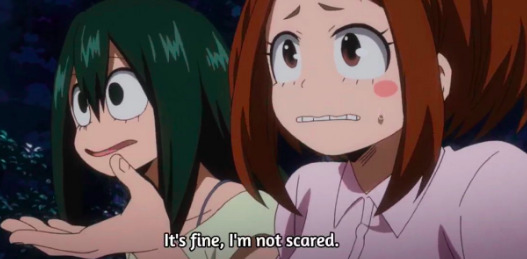
Deku=Tsuyu, Ochako=Bakugou, Momo=Todoroki, Mina=Kirishima, Jirou=Kaminari. And subsequently, TsuChako=BKDK; Minachako=Kiribaku, MinaJirou=KiriKami, etc.
All so good so far, but then I noticed that while Momo has a few moments with Ochako and Tsuyu, their dynamic doesn't really resemble Todoroki's relationship with the WonderDuo. Rather, the duo that Momo relates to who resemble Deku and Kacchan is actually Jirou and Kaminari, as I posted about yesterday:
Between Momo and Todoroki, I think the resemblance between MomoJirou and TodoBaku is actually striking too; the basic dynamic, the occasionally snippy friendship started at USJ, the way that the two duos Owned the second half of Season 4 (and the movie); more so than Momo/Ochako, MomoJirou parallels TodoBaku.
But the entire basis of the comparison I made was Bakugou and Ochako as counterparts. So I started pulling back and rethinking this. Maybe instead, the similarity is not just the Gender Counterpart, but that most of the supporting characters form into pairs (And occasionally trios) that resemble Deku/Kacchan.
aka:

Kaminari/Jirou - Kaminari plays Deku's role, Jirou Bakugou's.
Tsuyu/Ochako - Tsuyu plays Deku's role, Ochako Bakugou's.
Ochako/Iida - Between these two, Ochako becomes Deku's role, Iida Bakugou's.
Todoroki/Momo: AS I pointed out in another post, Todoroki plays Deku's role, Momo Bakugou's.

Kirishima/Mina: Kirishima as Deku, Mina as Bakugou; this one is pretty obvious.
Mirio/Tamaki; All Might/Endeavor, Erasermic, The First and Second OFA users, even Shindo/Tatami, and Bakugou's Parents Masaru and Mitsuki; multiple character duos throughout the series that parallel the mains. Obviously, the point of these parallels is to draw upon the large, overarching character duo that forms the heart of the show.
I am a little more fond of this setup for following the characters, since it's less gender based and more about the characters' personalities and overarching themes; I've already explained three of these (KMJR, TDMM and TSCHK) in detail, and the others are fairly self-evident.
However, that does present me with a final question, that I think many fans have been asking. Up until the Joint Training Arc, you could probably have made the argument that the basic parallel duos outlined here all follows a similar track to Deku and Kacchan's story.

Meeting and becoming foils/rivals (Deku and Kacchan's childhood, Todoroki and Momo in the entrance exam, Jirou and Kaminari at USJ, Kirishima and Mina in the backstory, and Uraraka and her foil being either Iida or Tsu in season 1)
The Deku analogue starts surpassing the Bakugou analogue (Todoroki to Momo in Season 2, Kaminari beats Jirou in the Sports Festival, Kirishima does better than Mina in the same arc)
The two become great teammates, though maybe grudgingly, for an arc (BKDK & TDMM=Final Exams, IICHK & KMJR=USJ, KRMN=Sports Fest, TSCHK=Training camp)
The Bakugou analogue confesses their insecurities to the Deku analogue (DVK2, Yaoyorozu Rising, Culture Fest arc, TSCHK=internship arc, IICHKO=Sports Fest prep room)
The Deku analogue helps reaffirm the Bakugou Analogue by confessing how much they admire them (same arcs for all but Ochako)
The duo cheer each other on more healthily in the Joint Training Arc (all of them except TSCHK)
During that time, of course, both duos interact pretty randomly with other characters. But earlier on, and starting in Chapter 217, BKDK themselves change their dynamic. As you all probably know, at the point we're at in Season 5, they pretty much added a third party member. Todoroki.
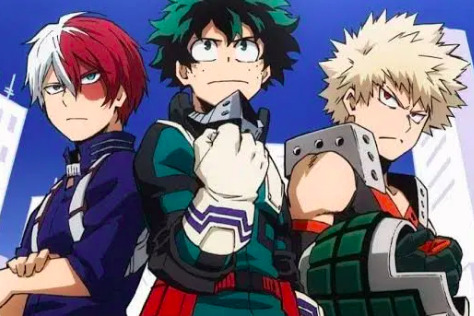
Ever since the Internship arc (in some ways, ever since the Sports Festival), Todoroki has been more than just Deku's friend and other rival. Todoroki has an equal relationship with both Deku and Kacchan, and you could make the case that Todoroki is just as much a part of the Wonder Duo dynamic as Deku or Kacchan.
They form something of a trinity. While Shoto isn't completely integrated into the OFA thing yet, he is so close to it that he might as well be.
And thus you get the conflict. Is MHA a story about duos - BKDK=esuqe character pairings that combine equal aspects, opposite traits, and complete each other to become great teams? Or is it actually about trios, TDBKDK=esque trinities that combine a third quality needed to succeed All Might?
This is where the question gets important to me. WE've always believed, I think ,in the simple narrative line presented by Deku and Kacchan. Win by saving, save to win. Two halves of All Might. Bring them together (and by extension, their analogue pairings) and you get your perfect hero team.
But what if Hori has actually shifted the narrative? What if Todoroki has actually been integrated into the Wonder duo narrative? Is there a third aspect of being the World's Greatest Hero that we're missing with just Deku and Kacchan as a hero duo? Since Hori is no longer using the Heroes Rising ending, what is the new one?
During the Winter Intern arc, Endeavor gave the Origin Trio three assignments: Rescue, Fighting, Evacuation. "Evacuation" is a strange title to symbolize the third category, but what if it does indicate a third aspect to heroism Shoto represents? And that integrating the three main All Might fanboys into his successors?

Shoto, who was raised to succeed him from birth and inspired by a video with his mom; Katsuki, who based his life around succeeding All Might and always winning; and Izuku, who did the same, based on his favorite video as well. And in that case, does the Momo/Kami/Jirou trinity parallel them, as I suggested?
Mind you, the "everyone is duos" concept is still just fine to me as an option. But I'm open to the idea that the story is all about trinities now. Tell me what you think.
#bakudeku#katsudeku#todobakudeku#todobaku#tododeku#kamijirou#momokamijirou#kiribaku#kamimomo#kirimina#iichako#tsuchako#lol my long rambly analysis post#attempting to rationalized in a few words#is it all about bkdk#or all about tdbkdk?#you decide
40 notes
·
View notes
Text
Parascientific Escape: The sci-fi “escape room” visual novel-style series nobody talks about
I can’t help thinking that Parascientific Escape would probably have an active fandom somewhere on the Internet if it wasn’t TRAPPED ON THE 3DS ESHOP.
I mean, it’s an escape room-centric visual novel-style sci-fi Japanese game that is clearly inspired by Zero Escape and very anime in its style. There are endearing characters, including optimal waifus/husbandos, plus a gradual buildup of an interesting fictional world full of political intrigue, its own countries, its own companies, and of course... psychic powers. Because you can’t have a trilogy of Japanese visual novel-style games featuring escape room puzzles without mental powers, now can you?
But as I said... they’re trapped as download-only titles for the 3DS. That’s fucking brutal.
Even so, there’s a pretty big 3DS/2DS user base still in existence. It’s not like they’ve never been translated or something, so at least we have the capability to play them. So if you look into them, what are you getting?
A basic overview: Parascientific Escape is a trilogy of anime-style games about solving escape room mysteries and tracking down evildoers via the use of psychic powers (obvious Zero Escape influences). There’s an overarching plot about a mysterious mastermind who believes it’s time for the recently emerged psychics of the world to take their place as the next evolution of humanity and get their own nation (obvious X-Men influences).
They don’t work very well as standalone stories; each story relies on information from the last one, culminating in a game that stars the protagonists of both parts 1 and 2 together as they finally unravel the motivations behind the events of the whole series and face off with the people behind everything. In addition, the escape room puzzles start out pretty easy in the first game build to be pretty frustratingly obtuse by the tail end of the third. And on top of all that, each game taken on its own only contains about 3-4 escape rooms. So when you bundle all three together, that’s when it all works as a single satisfying package.
Don’t worry about burning a lot of cash to play the whole series, however. The three games are $5.00 US each on the 3DS eShop and are usually on sale for $2.50 each these days. I got the entire trilogy for $7.50 US!
So let’s break down the gameplay and setup in a little more detail. Don’t worry; I won’t give any spoilers that go beyond the first five minutes of any game in the series. The twists and turns are part of the fun here.
The first game is Parascientific Escape: Cruise in the Distant Seas. You play as Hitomi Akeneno, a high school girl (because of course she’s a high-schooler) with the dual abilities of mild telekinesis and a type of clairvoyance that lets her peer past barriers or into the insides of objects. She finds herself trapped on a sinking cruise ship where some mastermind keeps systematically locking her into isolated sections while she’s trying desperately to escape.
I really liked how you could look inside of an object with clairvoyance and then use her telekinesis to manipulate the various switches and levers within, gradually pulling some object you need out from within a maze. I also thought it was clever how the solution to a new escape roomight require you to backtrack to a previous escape room to investigate some object or area that wasn’t relevant to that previous room’s original puzzle.

(One of the things I found most fascinating about this one is the ethical debate raised by Hitomi’s friend Chisono regarding how Hitomi got herself involved in all this. Chisono offers a perspective that is extremely unusual to see in most fiction. You can even say it’s pretty cold, but it’s not without having some merit to it. I don’t want to say too much about what I’m talking about, though; it’s better left as a surprise.)
The second title, Parascientific Escape: Gear Detective, almost seems standalone at first. You play as Kyosuke Ayana, a private detective and actual adult (!) who is 22 years old. A young woman shows up at his office and asks to hire him for protection. See, there’s a serial killer on the loose, and she believes she’s the next target.
We are swiftly told that Kyosuke was once in an accident that necessitated the replacement of his left arm and right eye. He volunteered to be a guinea pig for some very special prosthetics that granted him artificial psychic powers. As such, he now has “chronokinesis” — to the power to look back in time. However, he can only look back for five days, and he only has limited ability to move or manipulate the things he sees in the past.
Naturally, Kyosuke’s investigation winds up trapping him within some escape rooms that require use of his unique abilities to solve. Some of the hints at the proper timestamps or exactly where you should be looking when you peer into the past are a little vague, though, which can cause momentary frustration. Because I like to always be making forward progress, I actually preferred Hitomi’s telekinesis/clairvoyance powers from the first game. Still, Hitomi had some pretty basic puzzles in her rooms. I can’t deny that these puzzles took more thought.
Outside of the escape rooms, everything is undeniably a huge improvement. The first game presented strictly linear segments of storytelling between the rooms, but this one is more of an adventure game. You can choose where you go, select from a limited menu of things to do when you get there, and do all of it in any order you like. There’s usually a correct sequence order to progressing the story, but it’s typically pretty clear what the next step is, so it’s not like you’re just flailing about and trying a bunch of locations blindly. Besides, there’s no way to get stuck, so don’t stress it. There are even a lot of actions you can take that have no impact on story progression at all — they’re just there to generate additional dialogue that further develops the characters.

The tradeoff is that you actually get fewer escape rooms overall. The first game had four, but the second only contains three. This is also the first game in the series to introduce multiple endings; you get a number of dialogue choices throughout, and unfortunately, it’s far too easy to trigger the “bad” ending. There are guides online to help you trigger the Gold Star “true” ending, however. Just hit up GameFAQs. You might want to use the guide on your first playthrough, because I can say from experience that it’s annoying to have to replay all the dialogue sections just to make the correct choices. (Luckily, you can skip over any irrelevant sections of each chapter — including the escape room puzzles.)
In spite of my above whining, the second one is probably my single favorite story in the Parascientific trilogy. It’s a lot of fun.
The final game in the trilogy is Parascientific Escape: Crossing at the Farthest Horizon. Mysterious characters who were plotting offscreen for the previous two games are finally given faces, locations that were talked about extensively in both are finally visited, and the two protagonists of the first couple games finally meet and team up. It’s absolutely a culmination of what they set up in the first two.
The narrative jumps around from the perspectives of many different characters, but the most time is undoubtedly spent with Hitomi and Kyosuke. Sadly, there is no gameplay usage of Hitomi’s powers this time; the escape rooms are all done with Kyosuke, and they are more devious now than ever before. Personally, I found the next-to-last one to be incredibly obtuse and frustrating. I ultimately had to consult a video playthrough on YouTube for that. (The YouTuber in question didn’t seem to have the same issues figuring things out that I did. So I guess your mileage may vary.)

The “adventure game” segments make a return here as well, although they’ve also become a bit tougher to figure out. There are a couple of times when you might find yourself wandering the various location options, clicking on every possible action to try and progress. Luckily, there aren’t so many default options that you’re left flailing for very long. Even the longest period of clueless wandering lasted me a maximum of 15 minutes.
Once again, you have to make the correct dialogue choices if you want a positive ending. And once again, GameFAQs is your friend and co-pilot.
Ultimately, even the gated endings and occasional puzzle frustrations did little to curb my enthusiasm. I really had fun with these characters and their stories, I greatly enjoyed the majority of the escape rooms, and I was pretty satisfied with how it all wrapped up. The character designs/artwork get better and better as the series goes on. The selection of music tracks may be the same throughout the whole series, but I really dug on them, so I can’t complain. Do I have any other misgivings? Well, just one; the English localization is pretty sloppy. There are a pretty large number of typos, and the dialogue can sound stilted and awkward at times due to being a direct translation. It’s actually at its worst at the start of the first game. Luckily, after about 30 minutes of playtime, it settles in and finds its voice.
Seriously, they should really figure out a way to re-package these games for another system that doesn’t use the the dual-screen setup. Put all three of them together, and it’d easily be satisfying as a full retail release!
But for now, if you have a 3DS/2DS, they’re only $7.50 in total most of the time (and $15.00 at the worst). Do you like adventure game-style mysteries and visual novel-esque progression and, of course, escape rooms? You should give these a shot! And I hope these devs get to make games with bigger budgets and better localizations in the future.
#parascientific escape#parascientific escape: gear detective#parascientific escape: cruise in the distant seas#parascientific escape: crossing at the farthest horizon#3ds#2ds#3ds games#2ds games#video games#visual novels#Kyosuke Ayana#hitomi akeneno#escape room games
25 notes
·
View notes
Text
5D’s positivity!
As someone who likes and thinks a lot about 5D’s (1-64) and recently rewatched the series, I realized I have a tendency to get pretty frustrated/negative about how some things turned out at the end, especially in the latter half of the Dark Signer arc (which I may make another post about), so wanted to take some time to think about things I genuinely appreciated!
(For the most part) doesn’t completely drop/forget the non-Signer supporting characters from the beginning arc! I always thought it was funny how Himuro/Yanagi went from Yusei’s prison buddies to Rua and Ruka’s babysitters and it’s a nice subtle way to demonstrate how Yusei’s really someone who connects people together. Of course Tenpei probably could have been more of a character than he is, but
Also appreciate how Rally-tachi get a little more development in the DS arc--being the first to react to Yusei being King, for instance, and even getting to save his D-Wheel (even if it’s largely also comic relief) . It’s nice to see people caring about Yusei and trying to go out of their way to help/support him rather than Yusei just going out of his way to help others
I really really like the exchange Blitz has with Yusei in episode 37 when Yusei’s like like “sorry for causing y’all trouble ^^’ ” after they help get his D-Wheel and Blitz like “lol dude we’re your friends it’s ok you can rely on us” because I think it really shows that as much as Yusei believes in bonds/cares for his friends, he doesn’t always let them care for him. (Also similar to how Yusei helps fix Rua/Ruka’s duel disks but then leaves them so that he doesn’t cause them trouble.) Also clearly Yusei surrounds himself with supportive people which is gr8 (another reason why it really sucks that Rally-tachi are basically written out later--oops sorry this is supposed to be a positive post)
Carly’s character in general is pretty awesome. Maybe I just have low expectations for female characters in YGO, but even I think it’s pretty great that even though she’s obviously primarily introduced as a catalyst for Jack’s development, she’s also allowed her own character arc (which I think parallels Jack’s nicely), her own highs and lows, and her own motivations that are distinct from other characters. She even has some interactions--however minimal--with characters that have nothing to do with Jack (shocking!!!). Like I think it’s easy to forget that Carly actually met and talked with Yusei before she met Jack (not that that relationship is important, but still)!
She’s also an active character whose actions actually advance the plot (she’s the one who seeks out Jack at the hospital, she’s the one who decides to infiltrate the Arcadia Movement). Honestly, in 5D’s, especially in the DS arc, a lot of times the plot kind of just happens to our main characters (the antagonists do more of the plot-moving), and it’s refreshing to see a character’s actions actually moving the plot forward.
She and her thoughts/emotions are given a decent amount of dignity. When she dies and becomes a Dark Signer, obviously it’s important because wow now our rival character has something to be angsty about/motivate him, but also we get to see how she reacted to becoming a Dark Signer (poorly) and how she eventually became swayed to continue in the role.
I feel like all too commonly female characters become centered around another male character and you can argue that Carly’s character is basically about Jack at a certain point. But honestly, Jack’s character (his motivation and development) in the DS arc is, if not just as centered, at least centered a comparable amount around Carly, so it’s nice that at least they’re balanced in this way.
Overall, I could totally imagine, given the purpose of Carly in the overall narrative, that the writers could have had her be a Manic Pixie Dream Girl or have her simply get Stuffed in the Fridge, but they didn’t, and I’m grateful for that.
Also, Scoopshipping <3
Jack’s arc (even if rushed) and it’s relationship to the theme of 5D’s in general! If ultimately 5D’s is primarily about the importance of bonds (to the point that it’s the name of the first OP, and the reasoning behind Yusei’s multiple victories), I think the egotistical Jack learning to care about one person (romantically or not, although obviously they decided to go romantically) first is probably the best way they could have developed his character to support the overarching theme.
I like how the penultimate episode of the FC arc is about the Lonely King, Jack Atlas, and the penultimate episode of the DS arc revisits that King with Jack’s speech to Godwin. Honestly, I adore that speech in general--especially Jack’s line about how he’s not the King anymore, since it’s something he’s said before throughout the arc but more offhandedly.
I also appreciate how Yusei has pretty much no role in Jack’s arc after he beats him. Not that I don’t think he could’ve played an interesting role, but given the surplus of characters relying on Yusei in the series, I think it’s nice that Yusei literally has no idea about anything Jack goes through in the DS arc. Jack vs Carly is the only Dark Signer duel Yusei is not present for because he’s stuck in the rainbow pit.
Also, Scoopshipping <3
Rua’s arc (already talked about here)
They let Yusei lose!! (or basically lose--though tbh I’m pretty fine with his FC arc wins because they were all pretty necessary/plot-relevant and Yusei is always the underdog anyway) Also I think they at least tried to show with Kiryu the downsides of Yusei’s mentality about bonds and how his self-sacrificial nature can be bad sometimes. Having Kiryu hate Yusei’s guts because of what’s essentially a misunderstanding of an officer’s pat on the back is pretty dumb, but I do think there was potential in showing the darker side of Yusei’s loyalty to Kiryu as the latter became more and more toxic.
Speaking of Yusei, I really like the scene in episode 47 when Yusei’s like “yeah, after we beat the Dark Signers, everyone’s coming back!!” and Jack/Ushio are like “wtf you don’t know that’s true ??” and Rua’s like “stop Yusei’s sad too :(” I think it’s one of the more interesting moments of the whole group interacting with one another where you can see them playing off each other especially since clearly the situation is stressful and upsetting. It seems like Yusei feels like he needs to step up as a leader to boost morale but also still feels uncertain and doubtful, and it could have been even more interesting if Yusei had been allowed to be wrong about this, even just a little bit.
I’ll always have a soft spot for Ushio’s character development and the erosion of the prejudice that is a fixture of his character during the Fortune Cup. It’s also nice how it’s ultimately Martha and Takuya who help show him another side of Satellite, rather than Yusei. Ushio’s dynamic with Rua and disbelief about the Spirit World is also pretty fun to watch.
Little moments of continuity like Jack remembering Godwin’s metal arm in episode 62 and incorrectly guessing that he’s the 5th Signer like the rest of us thought, or Ushio recognizing Saiga in episode 45 since they briefly interacted before.
#yugioh 5d's#yusei fudo#jack atlas#carly nagisa#tetsu ushio#rally#blitz#kinda#jin himuro#tenzen yanagi#all this time never realized yanagi had a first name
44 notes
·
View notes
Text
The Greater Your Shadow Becomes
A recurring pattern in the Kingdom Hearts series is how often it misleads and misdirects us. We are told that Nobodies do not have hearts only to learn several games later that this was a lie. Our knowledge of Xehanort’s backstory has changed from one game to the next. The series itself even acknowledges its dishonesty, with the Master of Masters telling Young Xehanort that “the truth is what you see with your eyes, not what you hear[1],” while explaining that anything he says about his motivation and identity should not be trusted.
So despite Kingdom Hearts III, Back Cover, and Union X appearing to position the Master of Masters as the next main antagonist, I remain suspicious that the role the series seems to be setting him up for will ultimately be filled by another. A big part of this has to do with the patterns I have noticed among stories that follow the Heroine’s Journey.
In a Heroine’s Journey where there is a direct antagonist whose actions must be overcome in order to resolve the story’s conflict, that antagonist has commonly been presented as a narrative foil to either the protagonist or their Animus. In storytelling, a Foil is one character who is contrasted with another in order to highlight the other’s traits[2]. Most stories will emphasize the protagonist’s noble qualities by contrasting them with a character with similar personality traits or a similar backstory but who lacks the qualities that make the protagonist heroic. More often than not, these literary foils function as Shadow figures to the protagonist, and in many cases embody the negative elements of the story’s main themes.
For example, Gaston is put on a pedestal by the people around him as a paragon of what their society considers desirable. He’s handsome, skilled, and charismatic. Yet he constantly disrespects Belle’s agency and intelligence, not caring whether she’s willing to marry him or not. This positions him as a foil to the Beast, who is rude, monstrous, and has to learn how to perform basic tasks like eating with silverware. Despite his gruff exterior, he respects Belle’s intelligence and agency, holding her to the terms of their deal while also growing to prioritize her happiness above his own desires.
Something that the overarching antagonists of every Heroine’s Journey I know of all have in common is that the audience is made aware of their existence very early on in the story. Their motivations may change over the course of the story, and when we learn about their goals can vary, but we generally learn of their existence before the end of the first act.
We meet Gaston in the opening musical number of Beauty and the Beast.
Dr. Facilier from The Princess and the Frog also makes his first appearance in the opening musical number of his film.
President Snow gets at least a mention in the background in the first book of the Hunger Games trilogy even if Katniss doesn’t meet him face to face until the second one.
High Priestess Haggar is introduced in the first (technically second) episode of Voltron: Legendary Defender Season 1.
Meanwhile, the Master of Masters was only introduced near the end of Act II in the overarching narrative of Kingdom Hearts. Likewise, his goals are still unclear, in contrast to other Heroine’s Journey antagonists whose objectives are given to the audience at some point during the second act. So unless he turns out to be a familiar face under the hood, I find it unlikely that the Master of Masters will be the main antagonist of the next act. He’ll certainly play an antagonistic role, and definitely a major one, but everything I know about story structure is telling me that the “Big Bad” of the next arc is ultimately going to be someone else.
The repeated emphasis on prophecy, fate, and destiny in Act II of the series creates a strong undercurrent of defying fate being a major theme of the final arc of the Kingdom Hearts story. Sora’s ability to connect with others has enabled him to pull off feats that should be considered impossible up to the point of rewriting the fated defeat of the Guardians of Light at the Keyblade Graveyard in Kingdom Hearts III. So it stands to reason that the main antagonist of the final act will be a character who either tries to defy fate in a negative way, or a character who does things because fate dictates it be done.
So the major antagonist of Act III will most likely be someone who expresses the themes of fate and whether to defy or accept it in a negative way. Someone who serves as a foil to Sora. And someone who was introduced to the audience during Act I - meaning the original game, Chain of Memories, or Kingdom Hearts II. Given the amount of focus he has received since his introduction and how important Kingdom Hearts III revealed him to be in the lore of the series, there’s really only one person who qualifies:
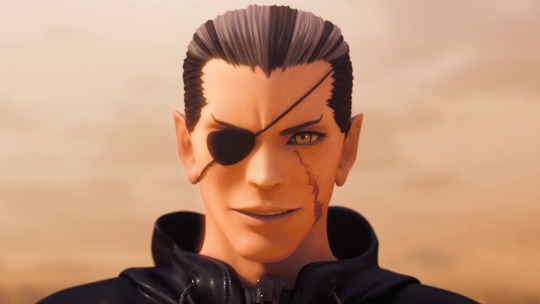
[Image Description: Luxu stares at the camera after taking off his hood in front of the Foretellers, revealing the face of Xigbar. End Description.]
As someone noted after the release of KH3, there are many similarities between Luxu and Sora when you sit down and think about it[3]:
Back Cover portrays Luxu as a young teen curious about the world, just like Sora.
Much like how wanting to be with his friends is shown to be one of Sora’s major motivations, Luxu’s Secret Reports in Kingdom Hearts III portray him as wanting nothing more than to be with the people he cares about[4].
Both of them take up these cosmically significant roles with no idea of what lies ahead for them - all the pain, separation, and loss. But they cannot stop or rest and go home until they finish their task because people are counting on them.
Where the two diverge is in their circumstances and how they reacted:
While Sora stumbled onto the mantle of a Keyblade wielder by accident and chose the responsibilities that came with his mission on his own, Luxu was given his by the Master as part of a greater purpose, and he carried out that role at his mentor’s instruction.
Both of them hide their pain and weariness under a playful façade.
Sora has spent his journey in the company of his friends and has relied on their support. Luxu has always been alone, relying only on himself.
Sora holds onto his connections with others even at significant cost to himself, while Luxu casts aside his bonds and puts his mission above all else.
In addition to his narrative connections to Sora, there is also his connection to Riku as well.
The scene where he reveals his face to the audience for the first time in Kingdom Hearts II begins with Sora initially mistaking him for Riku.
In Kingdom Hearts III, he’s paired with Dark Riku at the Skein of Severance, a combination that stands out in contrast to the obvious narrative meanings behind the choices of the other boss groupings in the Keyblade Graveyard.
Series producer Shinji Hasmimoto has said that Sora and Riku are the core of the story[5], so it would make sense, then, if the primary antagonist of the final act is someone with already established narrative connections to both characters.
Tetsuya Nomura had the end of the Dark Seeker Saga outlined since Kingdom Hearts II was finishing development[6]. This indicates that everything done with Xigbar across the entire series was planned with the Luxu reveal in mind. The fact that he chose to give Xigbar such a significant part and planned it that far in advance signals that our dear Number II has a major role in the overall narrative of the series. Between the implications of the reveal setting him up as a foil for Sora and the patterns exhibited by major antagonists of other Heroine’s Journeys, I’m confident that role will likely be that of the overall villain of Act III.
There is always the possibility that I could be wrong and that the Master of Masters will be the primary antagonist of the story’s final act. His influence of others and his writing of the Book of Prophecies appear to set him up as the author of our characters’ fates, which satisfied the narrative pattern of the antagonist reflecting the negative side of one of the story’s themes.
However, as I said, he was introduced much later in the narrative than is common for the overarching antagonist of a Heroine's Journey. I also have my doubts that it will be that obvious, as Kingdom Hearts has pulled that kind of bait and switch before. The first game initially sets up Maleficent as the main antagonist, only for Ansem to step out of the shadows and take the stage as the Big Bad for the remainder of the game after her defeat. Given how many parallels to the first game are found throughout Kingdom Hearts III, Xigbar being unmasked as Luxu and the information that came with it in the Secret Reports have the makings of an excellent parallel to that switch on a series-wide scale.
Sources:
[1] Kingdom Hearts III Re: Mind; Square Enix; 2020.
[2] Foil (fiction) - Wikipedia. https://en.wikipedia.org/wiki/Foil_(fiction)
[3] Galaxy Brain Take: Luxu and Sora Parallels; February 12, 2019. https://strangefellows.tumblr.com/post/182774246545/galaxy-brain-kh3-take-luxu-and-sora-parallels
[4] Kingdom Hearts III; Square Enix; 2019. (Secret Report #13: Observations, Excerpt 3)
[5] “How Kingdom Hearts III Will Grow Up With Its Players.” September 24, 2013 https://www.ign.com/articles/2013/09/25/how-kingdom-hearts-iii-will-grow-up-with-its-players.
[6] “Kingdom Hearts III Ultimania interview with Tetsuya Nomura”; March 12, 2019 https://www.khinsider.com/news/Kingdom-Hearts-3-Ultimania-Main-Nomura-Interview-Translated-14763
#kingdom hearts meta#kingdom hearts and the heroine's journey#story structure#kh speculation#kingdom hearts theory#kh luxu#kh xigbar
104 notes
·
View notes
Text
3. Thirteen Storeys, by Jonathan Sims
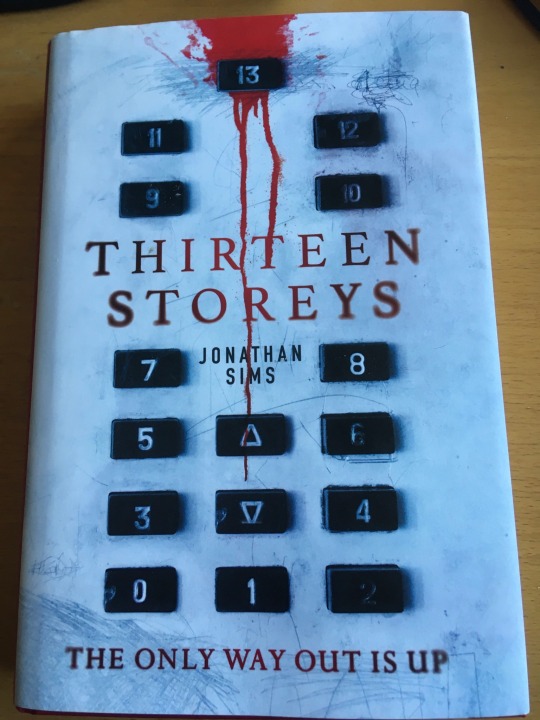
Owned: Yes Page count: 387 My summary: Something is wrong in Banyan Court. The luxury penthouses and suites hide the slums lurking behind. Strange visions stalk the halls, sights and smells and spectres following the inhabitants. And amidst the chaos, thirteen strangers are selected to dine with the billionaire who owns it. What happens next, none will speak of again. My rating: 4.5/5 My commentary:
I wasn’t actually planning to read this one for a while. I knew it existed - I’ve been following the author’s podcast The Magnus Archives since last year - but I wasn’t going to seek it out until my mother, entirely independantly of me, bought a copy. And for those who like The Magnus Archives, this definitely delivers on the same type of horror eperience! Surreal at times, creepy in both subtle and unsubtle ways, filled with metaphor and satire, telling an overarching story in a series of vignettes. I was very much into it.
Sims is excellent at producing a creepy atmosphere, and this book certainly heebied my jeebies, playing on modern fears and paranoia to get to the core of a very modern fear. I’ll talk about the underlying themes and metaphor a little later, but each of the stories in this novel stands alone as an effective horror premise. The lawyer haunted by connections and conspiracies, the labourer seeing the ghosts of exploited working people past, the single mother slipping into a drug-fuelled haze, the app developer whose life is slowly taken over by his virtual assistant - all of these basic realities taken and distorted and made surreal and horrific by exaggerating the consequences of all of these things present in our reality.
This novel really plays on the nature of reality for its surreal horror. Characters’ perceptions are shown to be false, lacking, or otherwise easily tricked. We see similar events from different perspectives throughout, getting a view on a scene or character from the point of view of different characters with their own subjective experiences, calling into question the truth of earlier events or encounters. I enjoyed a parallel between Anna and Penny and Jason and Max - with the latter, the fact that Max isn’t visible to anyone other than Jason (maybe) is a twist, whereas the reader can easily guess Penny is not visible to others. Yet we see Penny in the POV of other characters. This viewing of some events in the different narratives all helped them tie together as well, with some events being repeated to establish a timeline between the diverging narratives.
(Though I wasn’t sure in one instance whether an inconsistency was a genuine error - Leon’s girlfriend Andrea/Andi is referred to as ‘Angela’ a couple of times before switching back?)
Of course, there’s the central theme and metaphor of the novel - the exploitation of the poor, the working class, the desperate by those in power, and the varying levels of complicit that others are in the deeds of billionaires. I was going to describe these themes as timely, but of course, as long as there have been people who care more for money than their fellow human, this has been a problem. The apartments are haunted, literally, by those exploited by captialism, and each of the POV characters embody a different element of how billionaires destroy lives. Is it subtle? No, but I don’t think it needs to be. Sometimes, you just need a narrative to show you how terrible these things truly are - and the ending, though bittersweet, is totally satisfying.
And now, if I might be a little self-indulgent, it was really entertaining to me to see the likely origins of some of the horror in this book from what I know of Sims’ life. Violet in the first story working nights, characters worrying about prion disease after eating part of Fell - they were nestled in the narrative like little easter eggs, and I enjoyed spotting them.
Next up - a bit of fairytale!
10 notes
·
View notes
Text
The Strengths of serialization: A Disenchantment analysis
Note: this is a script for a video I’m making. There are some generalised statements in this script, that will be accompanied with visuals in the final video to help specify what I am referring to.
So, Netflix just dropped part 3 of disenchantment, and with the new batch of episodes came a slew of worldbuilding, lore, characterization, laughs, adventures, and Elfo abuse. But, instead of giving an overview of everything that happened in the season (or part) I want to focus on one specific aspect of part 3 and compare this to parts 1 and 2 and that is, the serialisation of Disenchantment.
In television shows, there are two main formats a show can take: A serialized format and an episodic format. A serialized format has continuing storylines that span over the course of the entire season. Think of pretty much every drama show. By contrast, an episodic TV show presents each episode as a self contained story. Meaning you could jump in at any point in the series without needing much prior knowledge to understand what’s happening. This is the format that most animated sitcoms, such as Disenchantment’s contemporaries, The Simpsons and Futurama, went for.
Disenchantment was an interesting case as it seemed to be going for a mix of both serialization and self contained episodes throughout its first two parts, which made up season 1. The first few and last few episodes of both parts 1 and 2 had a serialized format, where the cliffhanger ending of one episode would lead directly into the opening of the next. For example part 2’s opening episode ‘The disenchantress’ ends with Bean walking down a staircase to hell, which is picked straight back up on again in the next episode, aptly titled ‘Staircase to hell’. It’s required that an audience member watches these two episodes in order, otherwise they would be confused by the opening of the latter.
But then the middle episodes of parts 1 and 2 were stand alone episodic adventures, that didn’t always directly tie into each other. For instance, the heist plot of ‘the Dreamland job’ has little to nothing to do with Derrik’s character journey in the following episode, ‘Love’s Slimy Embrace’. So not much would be lost on an audience member who watched these two episodes out of order. The main throughline between them is Lucie buying and owning the bar. But that’s a rather minor element of ‘Love's Slimby embrace’, it’s not like you need an explanation of why Lucie owns the bar to understand what’s happening in that episode.
Where Part 3 really differs from the previous two parts, is that it sticks to a more serilized format for most of its run. Pretty much every episode develops on something meaningful established in prior episodes. For instance, In the first episode of part 3 it’s revealed that Pendegast has been murdered, so the third episode ‘Beanie get your gun’ is spent investigating what happened to him. They find out it’s the priestess, and chase her down in the next episode, which naturally leads into the steam land sega covered in episodes 4 and 5, and then the boat trip back to Dreamland in episode 6. Even when an episode doesn’t end in a cliffhanger, the events that occurred in the previous episode will still be playing on the character’s mind in the next, keeping a constant narrative flow throughout part 3.
Now, I do not believe that serialized Television is inherently better than episodic Television. There are shows that owe their success to their episodic format.
But I think in Disenchantment’s case, serialization fits the tone and scope it’s going for.
Disenchantment is basically a mystery show, Part 3 opens with several overarching mysteries that are investigated over the course of the season, and Bean literally plays detective in two episodes.
Part 2 also presented several mysteries in its opening episodes, like Bean’s heritage and the secret treasure the elfs are looking for. But this became a frustration I had with part 2, as it felt like it was presenting the audience with several tantalising mysteries, but then avoided expanding on them, in favour of more non sequitur adventures. Take the episode ‘the lonely heart is a hunter’ for example. That episode has a subplot about Bean investigating some old runes that are hinted to have a connection to her mother. But this basically leads nowhere as Bean gets scared and gives up on investigating them. We don’t find out anything about them for the rest of part 2, halting that story in its tracks. What the episode chooses to develop instead is the relationship between Zogg and a bear woman named Ursula, a character who has only appeared in this single episode to date. I do actually enjoy this plot line, I think it’s funny and gives Zogg some decent character development. But when the episode prioritises a somewhat frivolous love affair over expanding on the mysteries it’s already set up, it can be frustrating to sit through, because I’m just waiting for them to get back to that mystery.
There are still some instances in part 3 where they bring up an unresolved mystery or plot line but don’t follow up on it straight away. Like it should annoy me that they mention Leaveos quest early in the season, only for it to not develop any further until the last episode.
But it doesn’t, because there’s a narrative excuse for the other character’s to abandon Leaveo and his plot line. They have the more pressing issue of Dagmar to deal with in that moment, and after that I’m so swept up in the murder and betrayl stuff that I don’t mind them leaving Leavo’s plot thread for a little longer.
Another result of part 3 taking a more serialised approach is that it makes meaningful changes to the Disenchantments status quo
After part 1 ended with several series altering cliffhangers, that seemed like it was taking the show in a radically different direction, I was disappointed by how in part 2 everything reverted back to normal by the end of episode 3. Sure, there were a few status quo changes, but for the most part, part 2 still followed Bean, Elfo and Lucie’s shenanigans around Dreamland, not that fundamentally different from part 1.
But this isn’t a criticism I can level at part 3. For one thing there are no episodes of Bean just goofing around drinking, she’s always trying to get somewhere, figure something out, or face some threat to the kingdom. The constant rising urgency prevents the show from feeling as if it’s in some stagnant status quo.
The only time I was in fear of Disenchantment resetting to a status quo was at the beginning of episode 3, ‘Beanie get your gun’, when Derrik reinstates power to Zogg, the towns people don’t care about Bean supposedly being a witch, and Zogg’s forgotten about Odvals and the priestess’s coup attempt
The characters even comment on how weird the situation is.
With Bean and Zogg being reinstated it almost seemed like the whole coup subplot had been entirely pointless, especially as the opening of the episode hinted that Pendergast might not actually have been killed.
But the episode’s ending underlines the lasting impact this coup had, by confirming Pendergast’s death and having the priestess become a fugitive from the kingdom, basically writing out two major supporting characters.
On the subject, Pendergast’s death is the first one in Disenchantment that I was genuinely shocked by. Just because of the show’s willingness to kill off a recurring character without going back on it. They have done similar deaths before, like when Jerry was killed. But Jerry was divorced enough from the main cast and the setting of Dreamland that his absence didn’t feel as noticeable. It’s not like his death bared any repercussions on how Dreamland functioned as a kingdom for example. But Pendergast’s death does, you’re reminded of his absence any time you watch a scene with Zogg losing his mind, or see turbish and Mertz without their commander. Even if Pendergast is somehow brought back later, his death was still felt throughout the whole of this season.
Part 3 of Disenchantment managed to capture my intrigue, by taking its story and characters to interesting new places. My hope for part 4 is that everything part 3 built toward gets a decent payoff. By the end of part 3 most of the plotlines have still been left open ended, with even more opening up and others being teased at. In one case it looks like they might be rehashing an older plotline.
My fear for part 4 is that all these storylines are going to trip over each other. That part four has to juggle so many different plotlines that it’s not going to be able to devote enough time to each of them, making their resolutions feel rushed and underdeveloped.
I think its on part 4 to intertwine all these plot threads, so everything comes together to form one satisfying conclusion. Unless they’re planning on continuing the show after part 4, in which case I hope part 4 is a more streamlined and focused version of part 3.
Speaking of satisfying conclusions… I couldn’t think of one for this video! So let’s end off by discussing three times Disenchantment part 3 referenced 3 other Matt Greoning cartoons.
Starting with the most obvious, the ‘Trip to the moon’ rollercoaster seen in the episode ‘Freak out’ is a reference to the second Futurama episode ‘’The series has landed’, where the planet express crew visit a theme park on the moon. In particular the rollercoaster’s moon face bares resemblance to the mascot crater face. Look, it even has part of the rollercoaster going through its eye, just like how craterface always has a beer bottle shoved through their eye. Which itself is a reference to a silent film from 1920 called ‘A Trip to the moon’. Wait actually maybe the rollercoaster is just supposed to be a reference to that.
Seconally, the joke about the kings servants Vip and Vap living in unlawful cohabitation is a reference to the characters Arkbah and Jeff, who are a gay couple from Matt Groening’s comic, Life in Hell. They also share similar character designs.
And finally, I don’t think this was intentional, but Elfo skating on Dagmars oily back reminded me of Bart Simpson skateboarding. Now try and get that image out of your mind! Good night everybody.
#just posting this to prove this script exists#I’ll post a link to the video on this blog when it’s done#But my YouTube channel is Mac Monkeyhat if you want to look me up in the mean time!#disenchantment
12 notes
·
View notes
Text
Okay, so for my clannibal people, I have two recs where something very like The Dynamic has recently appeared in media. The first one has far more caveats than the second, but the first one is also the one where the ship is canon and has kissing.
The Method a Russian series from 2015 (it’s on Netflix). It’s about a young ingenue who decides to become a cop because of lingering trauma around an unsolved violent parental death (check), she’s accepted as the protege of an eccentric genius (check) through somewhat shady circumstances with some kind of ulterior motive (check). He, the eccentric genius, is not a serial killer- he’s a detective, but he is an absolute human disaster whose erratic behaviour and extremely questionable morals are tolerated by the police because they can use him as a weapon. He has totally killed people.
‘Byronic Hero’ is a vast understatement.
This show is grim, graphic, and very dark; it takes an extremely dim view of humanity in general and it doesn’t provide the hope or catharsis that Clannibal does- the protagonist does not get to have it all, so be forewarned on that. The implicit worldview and assumed ethical framework of the series is honestly appalling and the main characters are all fairly reprehensible by the end, so if you’re not prepared to deal with a whole lotta ugliness I would say don’t watch it.
The selling point to me is that the characters are interesting and the ship is very compelling. Again, it’s canon, so you will get satisfaction, but the actual romance is somewhat subtextual most of the time. Their connection is the lynchpin of the series, but it’s more about the protagonist’s ‘education’ into his world and an exploration of what that world is than it is focussed on them falling in love. He has no illusions or intentions about having a future (with her or otherwise), he’s trying to pass on his ‘method’ to a worthy successor, so his attitude is heavily informed by that. She is being broken of what idealism she ever had (told you it was grim).
Anyway, their relationship is very fucked up and the series has a legit horrifying (also aggressively stupid) conception of what mental illness is like, but it was very engaging and it was totally unapologetic about the romanticism of the dark love story, so there is a lot there for you if you want to see something like a Clannibal dynamic again. Just don’t expect the positive turn or healing. The ending is not happy or hopeful in any sense. You could make a good argument it’s a full-on tragedy, though I don’t think that’s quite the intent. And the tragedy is Titus Andronicus. If that gives you an indication of how grim we’re talking.
The plot does completely fall apart by the end (it’s like if OUaT were an r-rated crime show, it becomes that much of a mess), but the acting is good and it remains very compelling because of the characters.
Tell Me What You Saw a kdrama from this year. THIS is what I’m talking about. A young ingenue decides to become a cop because of lingering trauma around an unsolved violent parental death (check), she’s accepted as the protege of an eccentric genius (check), through somewhat shady circumstances with some kind of ulterior motive (check). She has to go visit him alone in a giant, creepy old building where he is confined (ooo, new check). He, the eccentric genius, is on the side of the angels and is again not a serial killer lol. He is a legendary criminal profiler and ex-detective who spends most of the series as a somewhat morally ambiguous anti-hero. He’s brilliant, he’s troubled, he broods and plays mind games from on high, and he’s always 17 steps ahead of you. I love him. Also, crucially, he is hot:
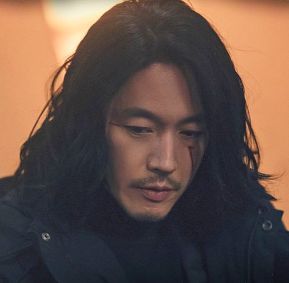
The first six episodes have great build-up to a not-totally-unpredictable but still fairly epic twist and then, sadly, the following episode is a bit of an anti-climax from what felt like it should be the jumping off point where the series kicked into high gear but turned out to be a bunch of wandering around aimlessly in very loosely connected episodic plots. There’s narrative justification for this, but I did feel like someone slammed on the breaks and switched gears. It takes a while to regain momentum and is never quite as focussed or well-balanced again.
The pros of the series are its very strong characters played by mostly very strong actors, quality atmosphere, great action, good suspense, and loads and loads of interesting relationships brimming with potential. The one that interests me most being, of course, the one between the protagonist and the profiler. It’s pretty much exactly the clannibal dynamic- he picks her apart and challenges her for his own reasons and then comes to enormously respect her; she is at first intimidated and angry but gives as good as she gets until she reaches a point of growth where she can challenge him in return. And, in the end, he has helped her self-actualise and become who she wanted to be and she helps him heal from his past to the point she can radically alter his outlook on life.
Their relationship is ultimately very positive for both and remains central to the series throughout. There are complicated feelings at play that are given some time in the spotlight, but it is sadly underdeveloped from what it should have been imo. Especially on his side. And there is no romance or explicit attraction, though I think the show supports her at least having a crush on him. If it had ‘gone there’ it would not have shocked anyone, let’s put it that way. They could have gone there. It is one of those flawed canons with good characters super ripe for fic. (Please watch this show and write fic so I can read it, is what I’m saying.)
The cons are that the story ends up being ridiculous on multiple levels and there are some intensely irritating moments of characters being profoundly idiotic and unreasonable just to keep the plot going. Incoherent motivation, mainly for the heroes, is a BIG problem. Apparently rampant police incompetence (including from all the main characters) is the second biggest problem. There is a fantastic female character who is the team leader for our main cops and she gets hit with both of these possibly the worst of anyone. The big reveal about her also makes no fucking sense. There was a maybe cliché but perfectly serviceable route they could have gone instead without changing anything, it seemed like they were setting it up, but they just go with... nothing. And in retrospect this undermines her entire character for the whole series. Which hurts because she was genuinely awesome.
So yeah. There are logic problems and all three ongoing major questions in the overarching story basically have terrible ‘solutions’, but it is extremely well-made in every other respect and the characters remained compelling enough that I couldn’t stop watching. The single-episode mysteries are usually very good with good pacing and satisfying resolutions. It’s consistently entertaining despite the frustration and it manages to pull out a fucking GREAT A+++++ ending right when you’re about to get super pissed off about more deterministic grim teenage nihilism ruining everything. The protagonist got to learn from all her experiences without losing her optimism, rise above adversity and be rewarded for her faith, and it was honestly so nice to get that. So unexpectedly hopeful and uplifting. I love a story that gets dark but never despairs.
If they make a second series with the same cast, I will be there with bells on.
#clannibal#media recs#tell me what you saw#the profiler is very OP in the best way I love this character type and I'm not ashamed#give me a super OP mess and I'm so happy#(as long as the narrative realises that they are a mess)#( if it doesn't then it's just ugggggh and probably heading for PCM at best and studom at worst)#anyway this is the same actor as played the insane love interest in Fated to Love You#Korean Johnny Depp#jang hyuk#he's pretty great#he's also an ex-boxer and real life martial artist whose entire body is rock hard so he's got that going for him as well#this show is very nearly Peak Aesthetic for him (all black clothes sunglasses shoulder length hair unnnf)#he needs the long hair#short hair does not suit him#(I realise I'm biased but it really doesn't)#this opinion has been reinforced mightily by this show and the show I watched him in where it was even shorter than in the shit half of FtL#(which is Wok of Love which I do not recommend at all it's terrible)#although that show also had bad lighting/direction which I'm sure didn't help#I mean it's Peak Aesthetic until they inexplicably decide to dress him exclusively in giant fluffy coats he never takes off (yes i'm salty)#why does this character have five different giant black coats what's that about#back to TMWYS now btw#my tag rambles are getting more confusing#he had a smart peacoat in the beginning and then it's all huge parkas#I understand it's apparently always freezing in studios and it was winter but cold is temporary looking cool is forever lmao#kdrama
23 notes
·
View notes
Note
Kylo Ren deserves all the hatred and shouldn't have been redeemed.
Ugh, this is a minefield. Look, I get why people hate Kylo Ren. I really do. But ultimately you’re talking to the wrong person. I don’t believe in “deserving” redemption. There’s no should or should not to me when it comes to redemption arcs- it’s more about can the writers pull it off effectively.
Kylo Ren’s arc ultimately did not do that. The sequel trilogy ended up being a mess of three disjointed movies with no overarching vision and thus weak and flimsy character arcs that amounted to an overall feeling of letdown. Pretty much every character is screwed over to some degree as a result, though some more than others *finnrosejannahpoeleia* I had a clear idea in my head as to how a Kylo Ren redemption arc could have worked in the movie series, but then rise of skywalker did basically none of it, so overall I was left pretty unsatisfied with the result. But I was never opposed to the idea of him being redeemed. Just the execution. With a clearer backstory, more coherent narrative, and doing literally anything other than whatever mess rise of skywalker was, it might have worked. They didn’t do that, so, it didn’t. There were structural issues with that film trilogy that go waaaaaay deeper than whether or not a single character was redeemed or not.
That said, there are two primary readings of Kylo Ren’s character that I’ve seen throughout the fandom, and which one you gravitate towards tends to inform whether you like the character and sympathize with him or if you revile him. I want to try and answer this from a neutral perspective and hold both sides of this debate for a moment.
The sympathetic reading is of “Kylo Ren the abuse victim.” These are people who see Snoke’s (later Palpatine’s I GUESS) actions as having preyed on a young man who was deeply confused and hurt by his poor attachment to his parents, who, whether we like it or not, the sequel trilogy (and relevant supplemental materials,) portrayed as being deeply flawed. There are comics and canon novels that are either explicit about or hint at Snoke’s abusive behavior towards Kylo Ren and it’s implied (though admittedly not super clear) that he was targeted from a young age. The problem is, none of that backstory or information is made at all clear in the movies. You have to seek it out, and the people who are seeking it out, generally, are those already sympathetic to Kylo Ren. This group was more likely to ship Reylo, tended to favor The Last Jedi, and supported the concept of “Bendemption.” I think in this group you see people who are more likely to project their own experiences of being an abuse victim onto Kylo Ren. They see themselves in him.
Then there’s the reading that Kylo Ren was an adult man who fell in with the Star Wars rough equivalent of Neo-Nazis, that he works as an allegory for white male rage. I’ve seen him compared to school shooters too. In this view he’s seen as a very nasty, vengeful, abusive man, who made conscious decisions to join the First Order and has continuously rejected any and all attempt at help. This group tends to see him as someone who threw away opportunities, who rejected a family that maybe wasn’t perfect but ultimately loved him and did their best. This group also tends not to seek out supplemental material that’s sympathetic towards Kylo Ren and pulls their interpretation solely from the films, which do not give much insight into why Kylo Ren became what he did (This isn’t a knock on them, you should not be required to read a comic to understand a character’s full backstory. That’s a failing of the movies.) This group was more likely to ship things like Finnrey or Damerey, tended to favor The Force Awakens, and preferred Kylo to die at the end of the story. This group is more likely to consist of people who project their experiences of a male abuser onto Kylo Ren. They see themselves in his victims.
(Again these are generalizations based on trends I’ve observed. Don’t make assumptions about any specific individual person).
The problem is that these two viewpoints are both valid readings, but they don’t talk to each other. Both sides also have incredibly strong feelings on the topic and just...were never interested in seeing why the other group saw things the way they did. Discourse broke down into shouting matches, bullying, and harassment. There are huge problems in both sides of the fandom. The ship war over Reylo is without a doubt the most vicious I have ever witnessed. There was also a lot of racism in the star wars fandom more broadly, and these two factions were no exception. Never, in all my time on tumblr, have I seen a fandom as toxic as the star wars sequel trilogy fandom. Never. Because of that, I hesitated to even answer this.
Now, there are people who don’t fall strongly into either camp, people who are just bopping along trying to enjoy things and may or may not like Kylo’s character. They might have an opinion on him but it’s not likely to be as strong. That group’s overall pretty quiet and don’t necessarily have intense, emotionally-driven opinions.
And look, I’ve had friends who loved Kylo and shipped Reylo, I’ve had friends who hated both. There really is space at the table for both viewpoints if the star wars fandom would stop eating itself alive for five minutes and listen to why people feel the way they do.
Anyways, you’re entitled to your opinion on him. If you hate him, you hate him, if you like him, you like him. I’m not commenting anymore on this discourse, so please don’t send me more asks about it. People who engage in bad faith over this post will be blocked- I have neither time nor patience for it.
5 notes
·
View notes
Text
“Picard” S1 Review: Doesn’t boldly go but is nonetheless engaging
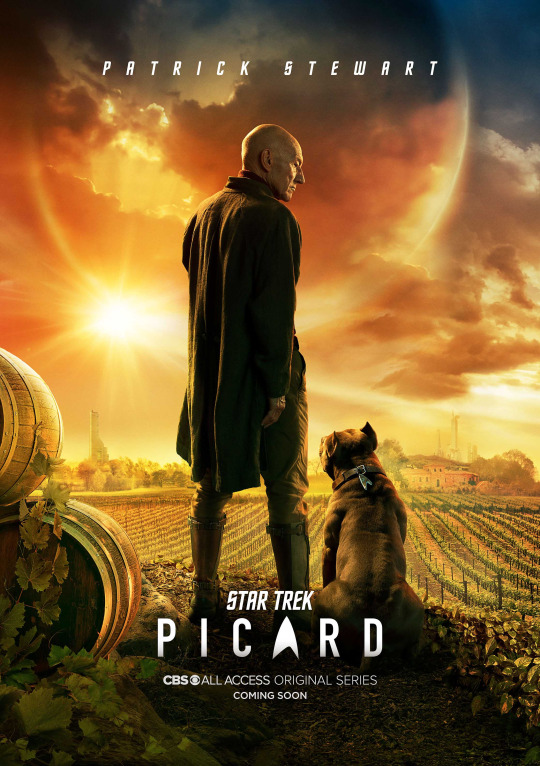
Produced by CBS All Access
Starring: Patrick Stewart, Isa Briones, Allison Pill, Michelle Hurd, Santiago Cabrera, Evan Evagora, Harry Treadaway
Many fans had high hopes for “Picard” going into CBS All Access’s continuing voyage into the Star Trek franchise.
Fans wanted to see the lore finally expanded into the future after its previous three ventures (Enterprise, Abrams Trek, and Discovery) took place in the past, bring modern themes and ideas to Star Trek’s futurist’s world view in a way that felt fresh and relevant, but most importantly continue the story of the franchise’s greatest captain; Jean-Luc Picard, of course.
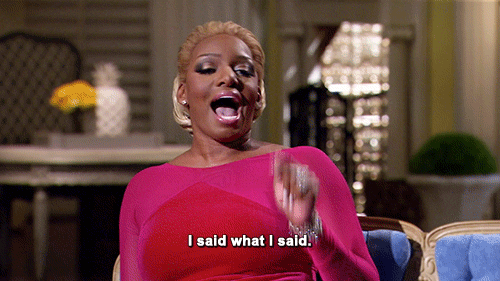
(He’s the best captain. This is not up for debate. Don’t @ me!)
In some ways the new series succeeds at this. We get glimpses of the previously untouched world of Star Trek post “Nemesis,” new themes that are resonant with real world events and exploratory, even critical, of the Federation’s worldview, and of course plenty of Picard himself as he navigates the strange new galaxy he inhabits.
But Picard ultimately misses the mark due to rushed storytelling, half-baked side plots, and just plain poor execution overall. It’s sad because “Picard” and this very talented cast and production team have their moments throughout this first season’s ten episode run but somehow even with 10 episodes of content to work with fans still end up with a somewhat jumbled mess.
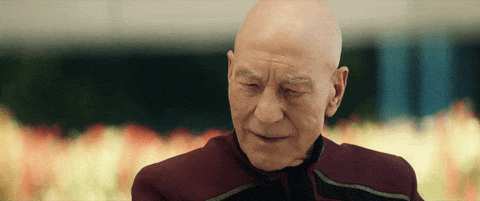
(Me by like the eighth episode.)
This isn’t to say “Picard” isn’t worth your time if you’re an avid Star Trek fan or just someone who likes Patrick Stewart in this role in general but the first season will leave you still hungry for more and not in a good way.
“Picard” continues the story of the titular captain, now retired admiral, many years after the events of “Nemesis” as a retired Jean Luc reflects on his life in Starfleet and of his late friend Data who gave his life for his. A synth ban has been enacted in Starfleet after a major riot on Mars some years prior and Picard is understandably sour on the idea, given his relationship with Data, while also fighting Starfleet on not helping the exodus of the Romulans after the supernova that wiped out their homeworld in “Star Trek (2009).” When a young woman comes seeking Picard’s aid after an attack by mysterious assailants, revealing that she is an android and the possible daughter of Data, and gets killed, it is up to the retired Admiral to find her twin sister before she suffers the same fate.
Before we get started let’s throw out some of the bad faith arguments on why this series wasn’t all that good.
“Picard” doesn’t suck because it has “politics” in it. At this point, if you are complaining about the existence of social viewpoints and political/philosophical discussions in your Star Trek, or let alone any series for that matter, I don’t know what the hell you’ve been watching the past few decades. Star Trek has always been more than just a show about cool-looking spaceships and laser beams, you neckbeards.
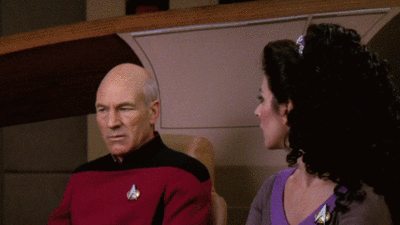
(Hell, even the other “Star” got more going on in it than that.)
It’s also not bad because of female representation or “girl power.” Again, Star Trek has always had this and frankly having a few more instances of the women of Trek taking center stage doesn’t even come close to rebalancing the scales on the overall massive representation of cis white men across the genre and even the series anyways.
Also get the fuck over the use of curse words in this series. While certainly some instances in this show felt awkward, the use of the word “fuck” does not dilute Star Trek’s overall story.

(It would have made earlier season’s funnier for sure.)
Now that that’s out of way let’s get into the real reasons that, for me at least, the series fell short of an otherwise promising goal of delivering great new Star Trek.
The main problem stems from the series overall jumping off point in its first episode. Picard is understandably still upset about the death of Data and having him deal with survivor’s guilt is a great way to bring this character into the future and reexplore the humanist viewpoints Data touched on in the older series. But also having Picard deal with his fallout from Starfleet, both from the synth ban AND the Romulan exodus, creates chasmic diverging plotlines that never quite come together. The story really needed it to be one or the other. Either Picard wanting to advocate for the continued existence of synthetic life or the rescue of the Romulans post super nova. The latter is touched on a bit through the addition of the character Elnor but doesn’t quite work given that majority of the Romulans in this series are portrayed as villains.
There is definitely a post Brexit, anti-immigrant hysteria message being told there but not enough depth and nuance is given to make it look like Starfleet was particularly wrong here to abandon them given that they do end up being spies committing espionage in the Federation and the clear villains of the first season. The showrunners could have brought these two stories together by perhaps making Soji a Romulan bent on bringing down synthetic life because maybe her twin sister died in the riots on Mars, making Picard have to choose between his commitment to both minority groups abandoned by the Federation but of course, that’s not what the series goes with.
Also suddenly shoehorning in a convoluted anti-synth worldview into the already ultra-secretive Romulan empire was muddled to say the least.

(A decent summation of the Romulans, pretty much ever. Also why is the only Asian actress in this scene in Osaka depicted as an alien, Mr Kurtzman?...)
Some of these ideas could’ve been saved through better editing and pacing though but not enough is done in this first season to mitigate these issues. Too much of plot is told through plain exposition; people sitting down and talking for five-ten minutes about prophecies and backstory instead of having the story simply show us instead. It makes the pacing often slow even by Trek standards and grinds the action to a halt even when there are lasers being shot at one another in the next scene.
Many of these plots get barely any attention too. The Borg cube, why it’s abandoned, and why Hugh is working for the Romulans through the Federation is given surface level development at best. Seven of Nine returns and at one point is momentarily hooked up to the Collective and she doesn’t really say much about it after it happens. The new character’s Rios and Raffi both have side stories given to their development that get touched on once and never brought up again. Dr. Jurati straight up murders her lover and is set to turn herself into the Federation and it’s just kind of forgotten about in the finale. And Elnor, well, he gets to do his best Legolas impression slicing and dicing fellow Romulans with his sword I guess.
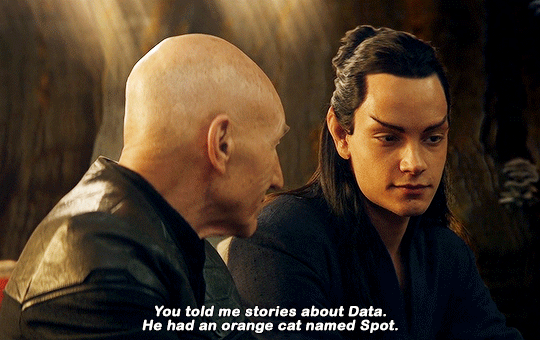
(He is still best boi though :3...)
The main co-star however, Soji the perfect android, has a particularly rushed development going from a scientist unknowing of her nature, to supposed prophet of doom, to predictably the savior all in one season. Her arc needed more time to develop with perhaps her Romulan love affair with Narek being the first season’s main driving force and her realization as an android being the climax.
Instead we get basically four seasons of Battlestar Galactica’s Sharon arc crammed into one season and it unfortunately makes the story feel half-baked.
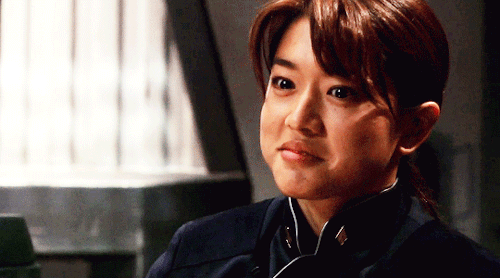
(Ok, Boomer.)
Don’t get the wrong idea, all these new characters have great individual moments as well throughout the season but sooooo much side plot is shoved in already into a muddled overarching narrative that it feels like several seasons worth of storytelling stuffed and edited down into a ten episode arc. Why the series felt it needed to conclude this robust story about synth hating Romulans in “Picard’s” first season feels like an unforced error in this reviewer’s opinion even if Sir P Stew only has maybe a couple seasons of extensive acting left in him anyways.
But the season isn’t completely worthless, as much as this review has been spent dunking on its less than stellar parts. The cast is exceptional, even working with the spare parts they’ve been given. Episode 5’s “Stardust City Rag,” in particular, stands out as a good mix of old and new Trek, with a decent dosage of cheese featuring Patrick Stewart trying on a French accent in a space bar. Santiago Cabrera is delightful as the ship captain Rios while also playing various forms of himself in AI form in equally enjoyable roles. Evan Evagora is fun as the deadly yet somewhat aloof Elnor, even if his character doesn’t do all that much except cut up a few Romulans. Seeing Jonathan Frakes and Marina Sirtis reprise their roles as Riker and Troi respectively in episode 6 was heartwarming and felt the most like TNG out of all the episodes. And Jeri Ryan seems liberated in this series in this version of Seven of Nine, no doubt glad to be rid of that restrictive corset and Rick Berman’s meddling hands.

(Big “Fuck you, Rick Berman” energy going on in this scene.)
The production value is obviously high level as Trek has rarely looked this good on the small screen. There’s some great cinematography throughout the season whether it’s Picard’s chateau winery, the haunting nature of the Borg cube, or the synth homeworld in the season’s final beats. The spaceships look cool as always and the world of the future feels well futuristic.
The musical score is also top notch, with a great opening theme that feels very much in line with Trek at its futurist glimpse into a hopeful cosmos.
youtube
The season’s best moments though are between Picard and Data and will remind you why they were more than likely your favorite characters on TNG. Generally speaking, exploring the humanist themes of artificial intelligence in new Trek was a good choice and having Picard deal with survivor’s guilt kept the pulse of the muddled story still beating. Brent Spiner is still great as Data and will remind you all again how talented he has always been as an actor and though his age seeps through the makeup a bit he is nonetheless still a perfect android.
Though the finale as a whole is underwhelming, the characters do share a nice final moment that is both touching and reminiscent of everything a fan loves about Star Trek. It’s a great cap to an otherwise ok return to Star Trek for TNG’s top characters and its truly touching in the best way that this franchise has always been known to be.
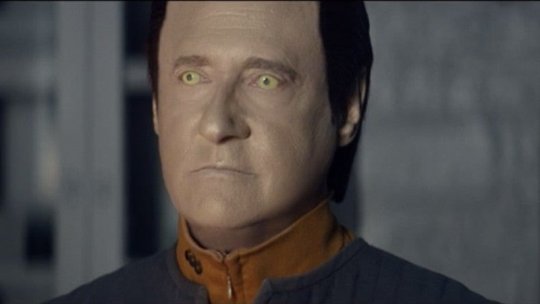
(Deactivating my emotions chip because I just..can’t! I just can’t, ok! *Sobs*)
But great acting and high production value can only mask so many flaws with a convoluted plot and “Picard” unfortunately suffers from the bloated and uncooked nature of its many ideas. What the story really needed was three season arc not just ten episodes and it shows. I guess the plus side is with this particular plot wrapped up it leaves the door open for new ideas and a fresh start in the second season but it does feel like an overall miss for Picard’s homecoming back into the universe of Star Trek.
Overall, though there are worse ways a Star Trek fan can spend their quarantine than watching “Picard” and there’s certainly enough here for fans to latch onto and have hope for better things in the next season.
Hopefully things are less rushed or at least more focused in the second season and we can see a more proper return to form for both Picard and future Star Trek.
Here’s hoping the producers and writers make it so…
VERDICT:
3 out of 5
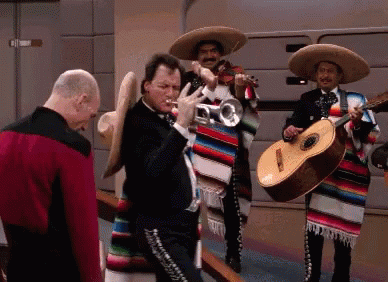
Let’s hope we get a return of Q in the next season.
#Star Trek#Star Trek Picard#Picard#Jean Luc Picard#Patrick Stewart#CBS#CBS All Access#Star Trek TNG#TNG#the next generation#Data#Star Trek Data#Brent Spiner#Sci Fi#science fiction#TV show#review#reviews#TV#gene roddenberry#Coronavirus#Covid19#Covid 19#Covid-19#quarantine#lockdown#Jonathan Frakes#marina sirtis#battlestar galactica#BSG
31 notes
·
View notes
Text
DISCO S3 NYCC TRAILER ANALYSIS!!!!!!!
sMESA BACK!!!!!!!!!!!!!!!!!!!!!!!!!!!
And boy oh boy was Saturday, October 5 such a good Trek news day!!!!!!!!!!!!!
so....let’s get back to some good ole analysis of the teaser trailer for Discovery Season 3, still likely to be about a year away before we officially see it
Trailer begins with our queen Michael landing in the future


that is a lot of dirt you might say, it’s like she landed near volcano or something

ohhhhh a look into her gear - so it looks like her science division badge, a phaser, and a communicator maybe, the black one that looks like a phone and has the Starfleet delta decal on it, and there’s some other equipment that I don’t know what they are
then we hear Michael’s voice saying “I’ve spent a year searching for that domino that tipped over and started all of this”
and by this, I think she means she spent a year trying to find the cause of why the Federation has “fallen” in a sense, as this would tie into what looks to be the theme of the season by the looks of the rest of the trailer
accompanying her voiceover, we see the following images
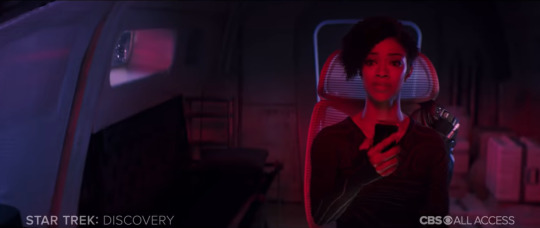

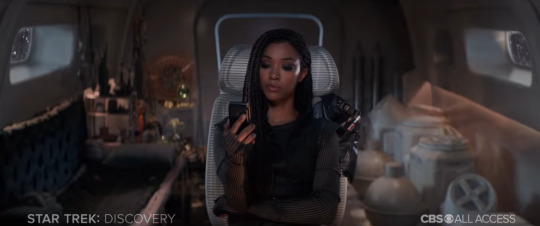
we not only see Michael’s changing hairstyle, but also how her mood has changed, going from worry and fear to almost resigned and ready for whatever that’s coming - also we see that she did seem to pick up more equipment or other objects throughout this one year period as indicated by the growing piles behind her
it is confirmed that Michael and the Disco crew did not land in the future together, so it looks like Michael arrived first, and the Disco crew lands one year after Michael’s arrival

here we see Michael with our new series regular David Ajala who is playing a character named Cleveland “Book” Booker, from the looks of this scene, Michael runs into him at some point and they seem to be avoiding someone else or being chased by someone else and are trying to run away and hide
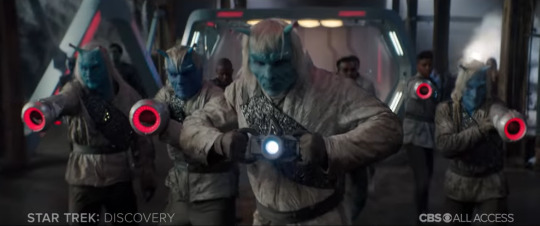
and it seems Michael and Book are running away from some Andorians with very interesting weapons, we also see some humans behind the Andorians - could this be some remnant of a Starfleet/Federation?
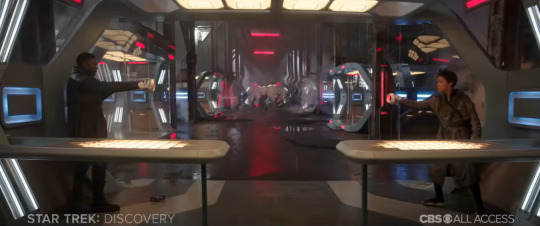
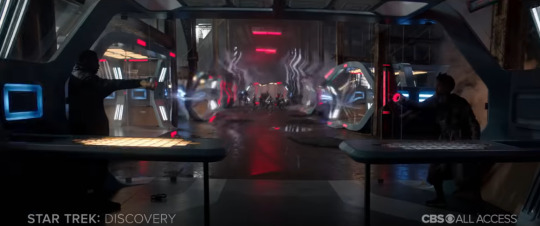

some sort of pulse weapon is released and Michael and Book are knocked flying and glass is breaking

Michael and Book are walking across some landscape and we got two planets in the sky - I’m not sure what this planet is or if this is even the same planet where Michael landed, but we do know from the panels and interviews that Michael and the crew did not land at Terralysium as they had hoped
Book asks Michael, “You believe in ghosts?”

Michael replies, “What does that mean?”

Book: “That badge on your shirt.”

the look on Michael’s face says it all - she realizes what he means - the Federation, Starfleet...they’re basically ghosts, something that doesn’t exist anymore
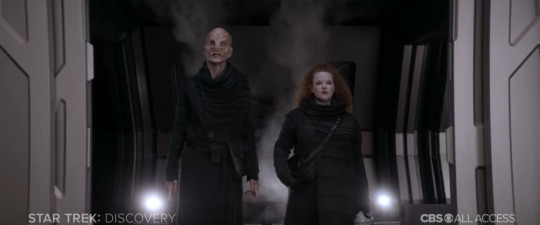
Saru and Tilly are the next shot that we see, the doors look to be the Disco bay area? Maybe they are getting ready to take a shuttle and go somewhere? They certainly looked to be dressed for it.
next we hear a man’s voiceover saying “I watch this office everyday, believing that my hope was not in vain...”
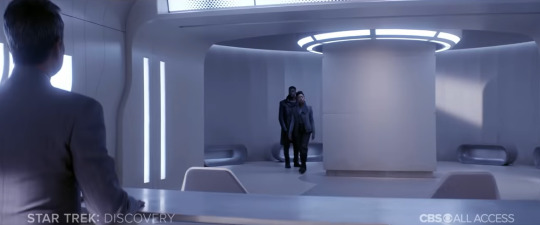
so Michael and Book are at this office and meeting the man speaking the voiceover, I don’t know if Book brought Michael there or if something else brought them there - like perhaps the people that were chasing them got them here?
and this man, I don’t know if he’s a Federation government member? or maybe this is a museum? or a believer of Federation ideals? or perhaps he is someone who is the descendant of a character we know from Season 1 and 2 (maybe like Ash Tyler) who has been told to wait for Michael and find her if she does appear in the future? that might be a bit of a stretch but it could be an easy way to explain his devotion and belief?
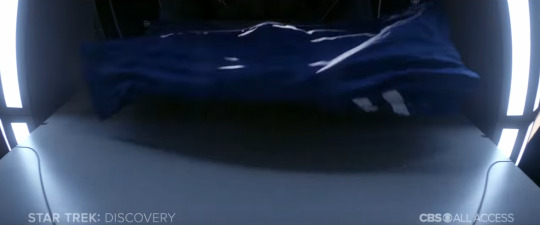
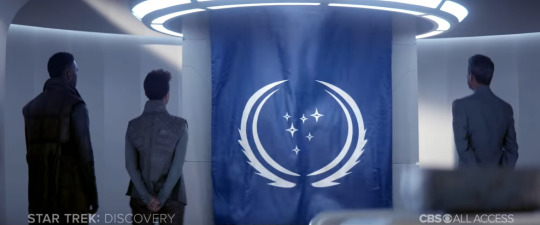
we see the flag of the Federation, interestingly this one has only 6 stars
just to compare it with, this is the usual flag of the Federation that we see

so at this point, it is looking like something caused the Federation to break up and become fractured? those 6 stars perhaps represents the 6 species/planets that are still standing together?
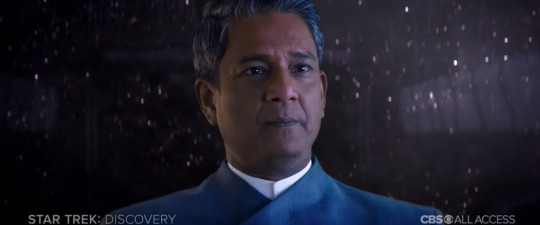
the man’s voiceover contines in this next scene, “...and that hope is you, Commander Burnham”
the fact that he knows her name is why I am inclined to believe that he is the descendant of someone who knows Michael and has been told to one day expect her

this next reaction shot of Michael’s face is not related to the scene before, as we see by the change in Michael’s hair, this shot is a year after the scene of Michael meeting the man above - this shot is likely Michael’s reaction to finding out that the Discovery crew has finally made it through

explicit confirmation of how many years we jumped into the future - so since Disco Season 2 mostly took place in 2257, this means that Michael lands in 3187 and one year later is 3188, when the Discovery arrives
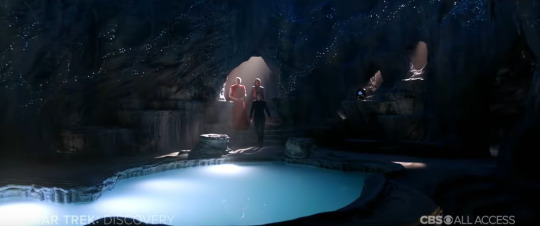
at the panel, it was confirmed also that we would explore more of the Trill, and we see that in the trailer - the two people in red are likely Trills, the person in the foreground doesn’t look to be Michael, but it might be her, and the pool is where the symbionts are
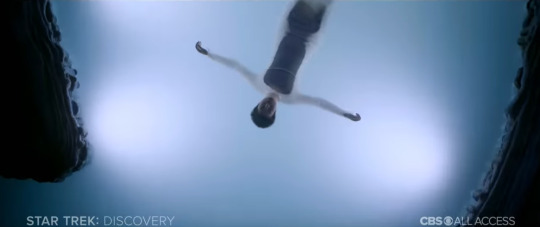
this could be Michael in the pool? or it could perhaps be another character who becomes a host? we have heard rumors that Disco Season 3 is possibly bringing in a nonbinary character, so this may be that person as this looks like the actor I was informed they had cast
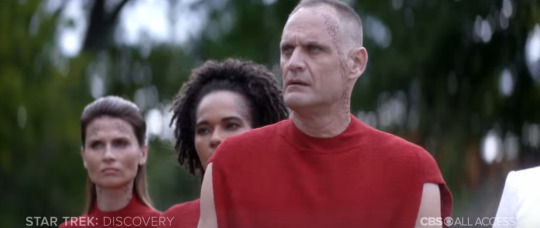
now these are definitely Trills, though it might be unlikely we will see the Dax symbiont from DS9 around in season 3, since I’m not sure the symbiont would be able to live into the 32nd century

and there’s Discovery!!!!!

REUNIONS!!!?!???!?!!
Michael has found her Disco family!

A shot of Detmer and Owosekun.
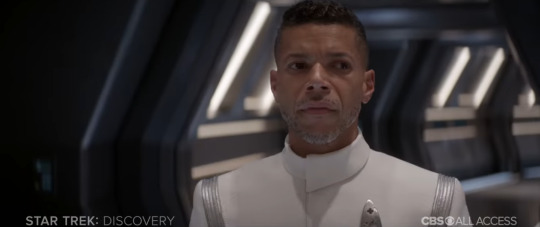
Culber looks rather concerned
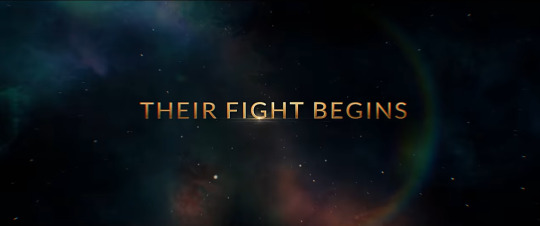

some sort of confrontation is happening in the spore drive room, there is at least one person holding weapons, some non-Disco crew people, maybe someone after the spore drive? it was noted that the drive may become a target
we do see Stamets and Tilly in the top right corner, but the person to their left kinda looks like Stamets?

Stamets and Tilly both look very unhappy and alarmed at the same time.

Book and Michael are fighting on that planet we saw them walking across earlier, and it looks like those Andorians or whoever was chasing them has caught up to them
the person Michael is fighting doesn’t look like an Andorian, but Book is definitely fighting an Andorian

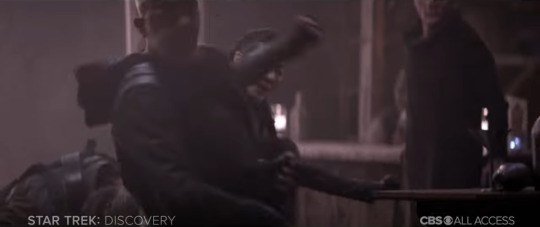
and here we see Georgiou getting into some fights as well, and we see Saru behind her - it looks like wherever Saru and Tilly were going, Georgiou went with them as well

this character here I believe is the nonbinary character they had rumored to have cast, and this might also be the same character we see go into the Trill pool and possibly be joined with a symbiont?
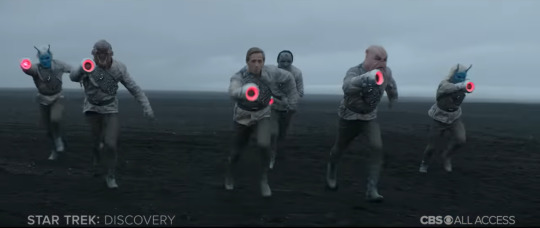
now this shot....ohhhhhhh
so from left to right, we got Andorian, a species that I cannot really be sure of, Human, Cardassian(?), Lurian, and another Andorian
they are part of the same group that we saw earlier in the trailer chasing Book and Michael

Book and Michael are booking it (sorry I couldn’t resist)
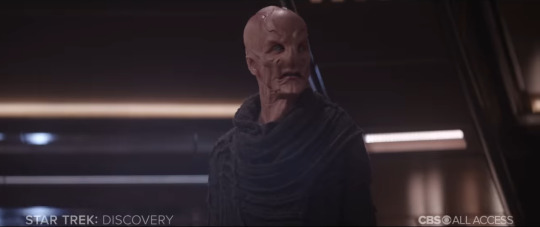
so through the last few scenes, we have been hearing Saru’s voice saying “This ship bears the name Discovery. She has carried us into the future, and it will be our privilege to make that future bright.”
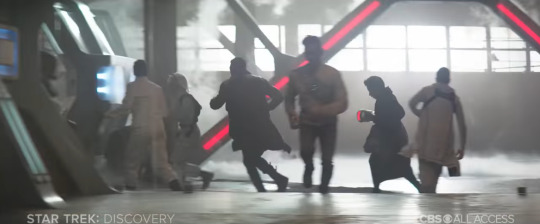
Book and Michael are sure not skipping leg day in this trailer - this looks like some sort of science facility?
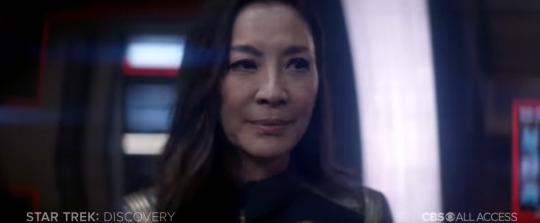
next shot is an interesting one - this could either be a flashback to Prime Georgiou, or this is Mirror Georgiou pretending to be Prime for some undercover sort of mission?
either way, she says “Let’s see how this plays out, shall we?”
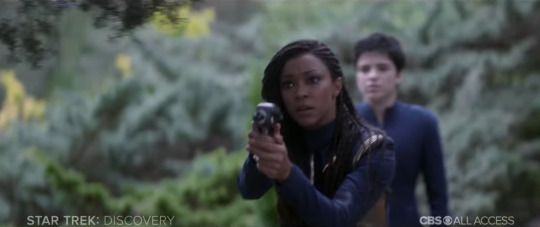
Michael pointing a phaser at someone, now judging by her hair, this is one year after she landed in the future, and the person behind her is likely that nonbinary character (who I really need to know the name of so I can use their name properly)
also interesting to note about her uniform - the color stripes don’t look silver
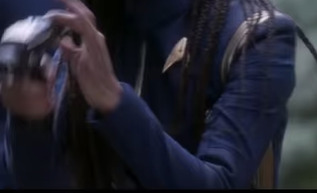
and a close up look on her badge....that’s the command division badge
now Michael’s uniform is missing the stripes across the shoulders that indicate a captain, but the change in color and badge looks like Michael is officially moving from science division into the command track and she will be wearing gold and not silver anymore

something is happening on Discovery and Owosekun is getting shaken around

Georgiou killing some folks
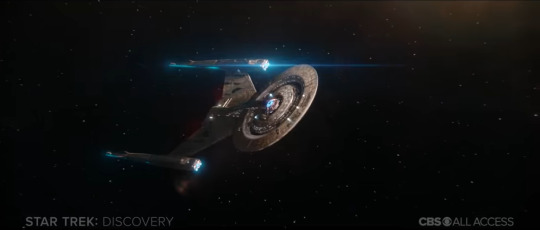
Discovery flying
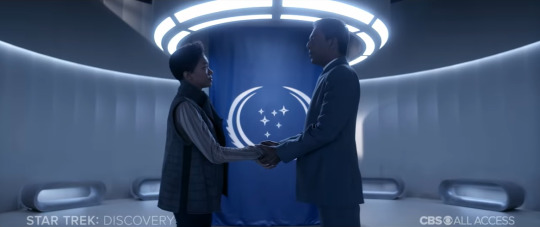
and finally, we hear the man say “Where will you go?”
to which Michael answers, “Wherever the answers are.”
but look at the way they are holding hands, you do not hold hands with strangers like that, I mean, short of this guy being a fan, this sort of familiarity speaks to a deeper connection, which just goes to further add to my suspicion that this character is likely a Ash Tyler descendant of some sort, or a descendant of someone who once knew Michael and has been waiting for her to appear in the future because they were told to wait for her by someone who had knowledge that Discovery went into the future
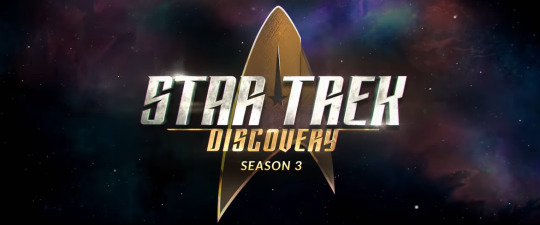
this logo color feels happier and brighter somehow

so there it is! the trailer giving us the first look into season 3! SO MANY POSSIBILITIES!!!!!
and I’m sure before its 2020 release, we will see at least one or two more trailers so we can have more of an idea, but I am so excited to see Discovery boldly go off into the future!!!!!!!!
whatever is happening this season, it’s looking like Discovery is going to be leading the way to rebuild a possibly fallen or broken Federation and restore it to the ideals that it once stood for! this is an interesting narrative, especially when compared to some of the themes we are seeing with Picard’s story and going rogue because the Federation won’t do the right thing to help.
I’ve said in other places already but it looks like Disco and Picard are both telling this overarching Federation narrative but going at it from two opposite ends with Picard detailing the gradual decline of the Federation while Disco is giving it a rebirth.
BRING ON SEASON 3!!!!! YESSSSSSSSSSSSSSSSSSSSSSSSS!!
#star trek discovery#star trek discovery season 3#disco spoilers#discovery spoilers#star trek#star trek discovery speculations#michael burnham#saru#sylvia tilly#paul stamets#hugh culber#cleveland booker#mirror georgiou#joann owosekun#keyla detmer
133 notes
·
View notes
Note
Kind of disagree with your last statement. Sure Naruto and Sasuke got more screentime than all the konoha 11 members, and Sakura got more than them too, but Kishi had an incredible and obvious favoritism for male characters. Even if we forget the Konoha 11, the plot revolved mainly around males and Sakura had much LESS importance than a lot of characters: kakashi, jiraiya, itachi and basically all akatsuki except konan, konohamaru, madara, obito, gaara, rock lee, minato, and the list goes on.
Nah, I very much disagree. Honestly the mere fact that you actually believe that Sakura had much less importance than characters like Madara, Minato, Lee and even Konohamaru is already pretty damn crazy to me, but here’s what many people don’t seem to get - Just because the plot has more male characters doesn’t mean that the author shows an apparent incredible and obvious favouritism for them; that’s jumping to unwarranted conclusions. The panel time and overall focus that the female characters received, relative to the number of female characters that are present in the narrative, was certainly comparable to that of the male characters.
Let’s take a show like One Piece for example - The gender imbalance in that series is the greatest I’ve seen since Dragon Ball. There are so many more males than females in both of those shows that it almost reaches satirical levels, but no one says that Oda or Toriyama has an incredible and and obvious favouritism for the male characters. And while this criticism is inapplicable for all three shows, it would at least make more sense for it to be levied towards One Piece and Dragon Ball when considering what I’ve just said.
Fact is, the plot didn’t revolve around male characters, it revolved around Naruto and Sasuke. But why would you think that Sakura had much less importance than all of the Akatsuki? What did Hidan and Kakuzu do that was so important to the plot for the 29 chapters that their arc lasted for? What did Sasori and Deidara do that eclipsed everything Sakura had done throughout the series? What did Rock Lee do in the series that had major ramifications for the direction of the plot? The two things he’s most remembered for was his fight against Gaara during the Chuunin Exams, and his Drunken Fist style against Kimimaro. Both were great, but were they really that significant to the plot? No. Characters like Gaara, Minato and Obito don’t have more importance to the plot than Sakura does either. Obito is important during the War arc and nothing else, an arc where Sakura was also important, and had been important for a long time before that as well. I don’t want to get into detail regarding every example you mentioned but I’m hoping you get the point. But as for Jiraiya and Itachi, those two are contentious because they were Naruto and Sasuke’s most prominent bonds respectively, outside of the one they shared with each other. However, let’s try gauging a few things regarding Sakura’s significance to the plot. For instance, she’s a main character and the heroine of the series, that immediately places her on a pedestal. Also, she was an integral component of the most important and overarching aim of Part 2 - Saving Sasuke from the darkness.
Here are a few other points just off the top of my head. Without Sakura…
Sasuke may have lost himself to the darkness as early as The Forest of Death.
Sasuke would have been killed by Gaara.
Naruto and Sasuke may have finished each other off on the hospital rooftop, depending on Kakashi’s main incentive for getting involved.
Kankuro would have died from poison.
Chiyo wouldn’t have been able to defeat Sasori.
The Zetsu impersonating Neji wouldn’t have been caught.
Naruto would have died on his way to Minato.
Sasuke would have remained trapped in the other dimension.
Naruto and Sasuke wouldn’t have been able to land the decisive blow on Kaguya.
Sasuke may have died in his initial encounter with Shin, depending on how lethal Shin’s attack was when Sakura intervened.
All of those points had very important effects on the plot.
You say the list goes on? Then by all means please list them all, and I will try and show you why Sakura had more plot importance than the vast majority of them.Honestly, I still can’t get over the fact that you claimed Sakura had much less plot significance than even Konohamaru. That’s kinda baffling 😵
49 notes
·
View notes